Photo
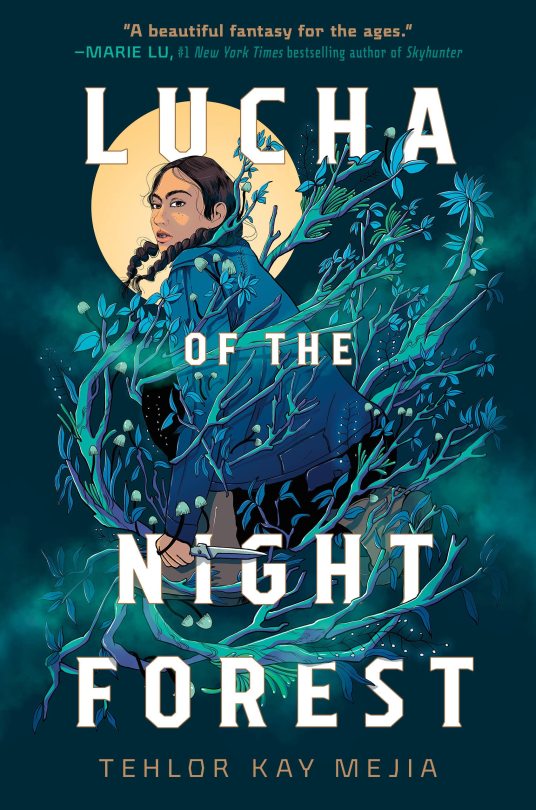
2023 reads // twitter thread
Lucha of the Night Forest
YA fantasy about a girl struggling to survive with her sister in a land overtaken by a forgetting drug, who makes a deal with a forest god to escape
spooky fungi magic, forest, sisters, lesbian MC
#Lucha of the Night Forest#aroaessidhe 2023 reads#ooouagh i like this a lot#def enjoyed the spooky fungi horror adjacent bits the most - which tbh is like 1/3 maybe 1/2#would love if it was spread more through the whole thing#though i guess I do understand that it represents a specific thing in the narrative and it wouldnt make sense to have that much more of it#I do think that the sort of…antagonist motivations and plot related to all that was a little simple#and I can imagine an alternate version that’s longer (series?) and much more complex which would be even better#which would result in her spending more time with the spooky fungi power stuff#but like also I guess there’s positives to a simpler standalone also. sometimes making something longer and more complex just makes it muddi#muddied and bad lol#she could have been a bit more evil is all im saying#i kinda wanted to know more about the wilder worldbuilding also -#tho understand that wtf would a poor girl who’s never left her town or the forest know about the wider world#the romance is a little instalovey i guess but also imo it’s only showing the beginning of a posisble relationship anyway?#anyway i gave this 5 stars. its my vibe. i wanna do fanart#yes girl kill him with mushrooms#sapphic books#lesbian books
28 notes
·
View notes
Text
"One of the main six is going to die" - an opinion piece
Again, a show-relating rant of sorts! I do apologize for that, but the static that I call my mind just will not stop producing. Hence I will subject you, dear reader, to my very own take on a very sensitive matter. Hence, blanket TW for discussion of d*ath. In the cusps of the season one finale of HH, I have seen plenty of discussion on the topic of "who is going to die" - following an age-old (/h-jk) statement of the creator that "one of the main six is going to die". There seems to be a common conception that this will be happening now - which we do not know for sure, even if this is going to happen at all is not certain! - and the discourse mainly revolves around Vagatha and Angel Dust, with some speculating about Charlotte or possibly Alastor dying. If we stick with the common idea that the death is going to happen in the finale of the first season (which I am not completely sold on!), all of these could be compelling story-defining events, lending new and deeper motivations for those around them to oppose Heaven - but they would also be terribly boring because they are so overt!
Thus, I want to revisit two ideas with you, dear reader.. who are the "main six" in question and what does "dying" mean for each of them?
For the first one, I do not believe that the addressed "main six" are the main cast of the show or even the main characters living in the hotel! Eight characters are living there currently (Charlotte, Vagatha, Alastor, Nifty, Husker, Angel Dust, Keekee, and Pentious) and while, yes, dear Nifty and Keekee have been more of a supportive staff for now, again, this would be too overt. I will offer you a different reading.. how about the main six characters developing the plot and conflict of season one - the possibility of rehabilitation, redemption, and the opposition of this idea? Would not a death in this rank have a much bigger impact on the narrative..? I present to you, dear reader!
- Charlotte - the leader of the rebellion forming, the spokesperson for the worth and rehabilitation of Sinners. Her death could be a tragic rebirth, thrusting her into her Becoming and the Blooming of her powers. - Adam - the leader of the Exorcists, her direct foil and antagonist. His death could be an escalation of the conflict and/or the gateway to the introduction of an even Greater Evil.. we don't know what Exorcists really do all year long, and what if they keep the Greater Evil at bay? (Hints for Roo, possibly, and/or the things not written in ink). - Vagatha - the fallen Angel, protector of Charlotte, her partner and confidant. Her death could be a rebirth as a true Demon or Angel again (redemption through sacrifice, perhaps?) or a permanent fixture to support Charlotte's drive for justice. Also, why is no one talking about the possibility of HER having killed the Exorcist? - Lute - the second in command to the Exorcists and Adam's companion, as Vagatha's foil. Her death could be just as much a trigger to violence for Adam and the Exorcists, pushing the conflict to a new level. (Also, as a little side note.. we have seen her face. That cannot be a good sign! Also, what are the LED screen helmet designs all about? I cannot stop thinking about it!) - Emily - the Seraph who comes to the same conclusion as Charlotte, that Heaven has to be a lie. Her death could be a reprise of the Fall of Lucifer, her joining the main cast in the fight against the double standards of judgment to make right of what is wrong. - Carmilla - the Sinner (and possibly fallen Angel, seeing all the thematic ties she shares with Vagatha) who seems to know that Heaven cannot be trusted, but speaks for the status quo to remain unchanged - her call to conservation is a foil to Emily's drive to change. Her death would shake up the Overlords, possibly opening up the scene for the Vs to spark the fight on their front.
In my humble opinion, Lute and Carmilla would make the most compelling candidates for the character to die, if this is to happen in the finale of the season. The potential impacts of their deaths could be magnificent while also omitting the sacrifice of characters that bear the possibility of age-old, deep conflicts and developments yet to be seen. What do you think?
#hazbin hotel#hazbin theory#hazbin charlie#hazbin vaggie#hazbin lute#hazbin adam#hazbin emily#hazbin carmilla
26 notes
·
View notes
Note
You commented on not being a fan of non-pc pov scenes in ap, something that Aabria used in the first go of exu (which was one of the main things that put me off of it, tbh). Do you have any thoughts on how this is applied in EXU compared to WBN?
So for EXU there's some parts that are better, and some that are worse. The good thing is that they're very brief snapshots vs. the one in WBN that was like, an extended several-minute scene. I also actually kind of like the ones for Ted, since that makes sense; we know it's impossible to really get Ted's perspective otherwise and you can kind of handwave it as being related to Opal and floating about in her unconscious.
The ones for My'ratta and Poska on the other hand, while again, brief, sort of underscore their lack of development. We did not know what Myr'atta wanted until episode 93 of Campaign 3, and as I've said before I literally could not tell you what the goal of the Nameless Ones or Poska is. They serve no purpose narratively except as a ticking clock and shadowy threat to get the Crown Keepers to leave a place quickly.
I mentioned Otohan in my original post on this topic as an example of an underdeveloped antagonist, something Brennan mentioned as something he hoped to avoid, and Myr'atta, Poska, and Otohan are all ultimately cut from the same cloth: cool aesthetic, cool abilities, and a severe lack of in-game development. I don't know what motivates them (or in Myr'atta's case, didn't while they were an ongoing part of the story) and so they all bore me. They are flat, dull villains who say threatening shit that means nothing because I don't know what drives them. I don't want to keep getting into it because it kind of derailed my original point anyway but what frustrates me the most is how people keep saying "oh but I'm sure they have a motivation." Like yeah bitch. I'm sure they do. The GM has a responsibility to convey that in-game. And they can do so subtly! Believe me, I am glad to do the work of unpicking motivation from allusions or what is carefully unsaid; this is what makes Ludinus and Liliana (and Lolth in EXU) interesting! But it's telling that whenever I'm like "what the fuck does this character do other than serve the purpose of a Plot Device to either threaten or move the characters", no one ever like, explains their motivation to me; it's always "give it time! I'm sure the GM has something in mind." Well, both Myr'atta and Otohan died before we got that (we still don't have it for Otohan) so I think we can safely say the waiting game is for suckers. Like, if you like characters based on aesthetic alone that's valid as a choice, but I'm not taking your meta or arguments seriously because that's a superficial judgment.
It's also frustrating because it's like...the GMs and the fans who keep insisting to be PATIENT long after a boring antagonist has worn out their welcome for me are simultaneously like "the audience will not remember this guy if I don't shove them in their face in a stilted cutscene" and also "clearly, the audience will infer that this boring-ass antagonist MUST have something deeper going on and therefore they will extend credit indefinitely." It's the absolute opposite of what they should be prioritizing. Instead of trying to jingle the antagonist in front of me like keys while still doing nothing to develop their personality, maybe have the party...idk, have a vision. find a letter. learn something secondhand from someone talking in a bar that sheds light on their motivation.
In WBN it's actually a totally different problem. The scene is 100% unnecessary. We know what the Man in Black wants. We know what's going on with him. We know his goals and his allies. We saw him only a couple episodes ago and he's been a topic of discussion throughout a good chunk of the arc. Hell, we even know how dope-ass his aesthetic is. This is just showing something the party doesn't know and can't act on, for several minutes of Brennan talking to himself, and I think it actually destroys what would be a gut-punch of undead Sir Curran showing up on the opposite side of Eursulon, whose entire deal is being inspired by him.
So: The EXU scenes are less intrusive for their brevity, the fact that the Ted ones are pretty good, and that at least they don't spoil a moment, but at the same time they still don't solve the problem of an underdeveloped antagonist for Myr'atta and Poska. The WBN scene meanwhile drags on, and actually does too much by taking what could be an unbelievably devastating reveal and having it happen when Eursulon isn't even there to respond. I couldn't tell if this actually spoiled it for Lou, since they record well in advance, but if it did that's such a missed opportunity.
Anyway I think my point is that (with the exception of the very first scene of a campaign that is setting the stage, before the PCs are introduced) these cutscenes only work if they are extremely short and purely for vague flavor. I think if you want to have a scene with no PCs present, you should perhaps write a book or a screenplay instead of playing D&D.
#answered#ultimate-queen-of-fandoms2#long post#cr tag#wbn tag#what also gets me is that both wbn and cr have done like...sidequests with new pcs to fill in the gaps#eg calamity and downfall; the children's adventure and the twelvebrooks and the upcoming patreon one-shot erika is dm-ing#it's hard to do antagonist work with the main cast bc then they know too much#but like...if you're gonna cut away mid-campaign may as well idk invite some guests to play out a vanguard one-shot#and give otohan a shred of personality. i get it's harder than just a cut scene but. don't get into actual play if you want ease.
19 notes
·
View notes
Text
i am way too late for any of this, but i felt like ranting a little (a lot) over tma, so here it goes.
i actually really, really liked the dreamlike quality of the S5 statements. i think they're some of jonny's best work. so evocative and just beautifully written, the feeling of horror so prevalent, so delicate, so entrapping. i would listen to them absolutely enthralled. what a submersive experience. so on that front, 100% would recommend.
the problems i have are mainly with the meta-plot. certainly, personal preferences and biases come into play here, bc i despise jonmartin with the fire of a thousand suns and would have loved a jonelias corruption narrative, but, i feel that, in his quest to appease the j-mart shippers, jonny sacrificed a lot of his story's integrity. also, i have no way of verifying this, but it also felt like he inserted his own biases in a way that wasn't necessarily productive.
ultimately, i feel like he disrespected his main antagonists and that essentially translated into a sort of irreverence towards his own story. elias was easily his most dramatic and interesting villain (regardless of what he originally intended for him, it's how he developed throughout the story & i think there is a certain honesty in a writer acknowledging and respecting that), stole every scene he was in, yet after his great villain reveal in S4, he is absolutely absent throughout his entire apocalypse. it creates a lack of catharsis that i find bothersome. his death is way too easy. yet when he finally appears in MAG 193, it is glorious. he is terrifyingly in the throws of religious ecstasy as the eye's pupil. such an interesting idea! so little it was developed though bc jonny for some reason doesn't like elias.
there's this entire commentary about how elias is really just there to be eye's pupil until jon takes over from him, bc it's jon the eye truly desires. as if after faithfully serving the beholding for two centuries and bringing about his ritual, the eye would just disregard elias and actually be interested in the one person who is unwilling to play ball. please be serious. not saying that jon can't be the eye's "special little boy" or whatever, but the nerfing of elias/jonah borderlines on petulant. ofc, jonny is the author and you cannot begrudge a man for writing whatever he wants, but, as a listener, i have to say it feels very unsatisfying whenever authorial biases directly affect the storyline. very deus-ex-machina. very unearned.
i also have a problem with how the eye was ultimately handled and, once again, nerfed. the introduction of this element in relation to the beholding, that it sees but does not understand, felt very trite to me. it was added as a way to de-power the eye and elevate the web. but how could it even be true in the context of the entity conceptualization? the reason scopophobia is a thing is because people fear someone is behind the watching. what they fear is judgment or someone keeping tabs on them and using that information to harm them in some way. that requires intelligence, a capacity to distinguish between the harmless and the incriminatory, a propensity for casting moral judgment, of holding people accountable, of assigning blame, of discovering people's deepest, darkest secrets, of weaponizing shame. no one is afraid of a crow or a cat staring back at them, because, while those are also living beings, they lack the higher intelligence that creates the context necessary for scopophobia. so how can the eye not possess intelligence? apparently it doesn't, because jonny decided he didn't like the eye and the spider was oh-so-cooler instead.
but that only lead to the spider being way too overpowered than it should have been. as the so-called brain of the operation, the web really manifests a lot of faults that could have been exploited, yet the character never do, because the web needs to be true It Girl for some reason. this all feels very childish. the web's motivations do not work in-universe. we are often told it doesn't have a ritual because it is content with playing its games of manipulation within the world as it currently is. and that honestly seemed a rather fair assessment to make, but later proved to be a red herring, because it was the web that was actually behind the eye's own ritual.
i have several gripes with this. 1. if the spider is so smart, why doesn't it/can't it have its own ritual and re-shape the world according to its own preferences? why does it have to piggyback on the eye's grind? 2. the spider's big plan seems to be bringing about the eyepocalypse just to convince the characters to let the fears out into the metaverse so it can start again. because, as it turns out, the eyepocalypse isn't really it's preferred state of being? it was the status-quo after all? the web DID prefer the world as it was, because it allowed it to thrive off manipulation and puppeteering, things it can't really engage in as much as it would like, since now everyone is trapped inside various fear domains. so, why-oh-why, not just leave the world as is? why even bring about an apocalypse in the first place if your intention is to always inhabit a apocalypse-less place?
i felt like this was such a plot-hole of an explanation the way it was presented. the web's greatest flaw was that it loved intricate plots so much there was a real danger of over-complicating its own plans and failing to see the forest from the trees, so to speak. the eye could have been used not to boggle down on meaningless details and ramifications, but to get a better sense of the bigger picture, something the web could very well lose sight of (pun intended). so the web's "plan" could have been ultimately rendered meaningless, because instead of choosing the simplistic, straightforward, occam's razor solution (no apocalypse, just thrive off the world as it is), it chose the overly complicated path that placed it in a situation it didn't thrive in (eyepocalypse) and made it even more complicated to get out of in the first place. it basically surrendered its destiny into the hands of people who had zero reasons to act sympathetic and could have very well chosen to destroy the entire world, fears included. and yet i am supposed to be in awe of the web's great intelligence and buy into the whole dumb eye propaganda?
many things have already been said about the moral dilemma at the end of S5 and my take on that is that jon was right. it was the merciful and just solution to prevent other people from other universes from suffering at the hands of fear entities. but i will be indulgent and account that it is a difficult choice to make for anyone, since human beings are so survivalist in nature and the choice to just make the fears someone else's problem in the hopes of their plans maybe getting foiled more effectively by others is tantalizing. who knows what any of us would have chosen had we been in their situation? perpetuating the horrors on someone else just so you could get reprieve is so cravenly but it's human and i get it. however, by no means is this a happy ending the way it was framed by the narrative. what melanie, georgie, basira and martin did was horrible and evil, but it is never acknowledged in that way. the least jonny could have done is have jon resist martin's selfish decision and have martin genuinely kill him. but, no, martin gets his romantic send-off together with jon, with the open possibility that they get transported to another world where they could start over. melanie, georgie and basira get to start a new life in the entity-less world, after contributing almost nothing. the worst characters get to live & they're validated in their awful behaviour.
however. i do feel like there were other ways to resolve the eyepocalypse without resorting to a horrible sophie's choice in the first place, but that would require a more extensive endgame re-write.
#i also think that the ending was peddled like a tragedy just bc jon & martin didn't live#but imo the ending was pretty horror-like to begin with#the fears escape into the multi-verse and get to terrorize a new set of people!#also if you ask me the fact that melanie/georgie/basira live is a tragedy in and of itself#but ofc the narrative frames it as a good thing#the magnus archives#elias bourchard#the archivist#anti jonmartin#jonelias#putting this in the tag bc that would have been the superior plot line#the beholding#the eye#here i am running my mouth off again#tma critical#magnus critical
101 notes
·
View notes
Text
seasonal animes: Oshi no Ko 01-06
I mentioned a bit that I was watching this one but I never wrote anything very substantial about it, so lets remedy that!
Oshi no Ko is wild. Every time I think I know where it’s going, it goes somewhere else.
The premise already sounds pretty deranged. Here’s what I knew going in. A gynecologist is visited by the idol Hoshino Ai he’s obsessed with, who’s pregnant with twins. Just before the twins are born, he’s murdered by a stalker. He’s reborn as one of her kids, along with one of his previous patients who was also obsessed with the same idol; they’re now named Aquamarine and Ruby and have... a less than easy time containing their otaku impulses.
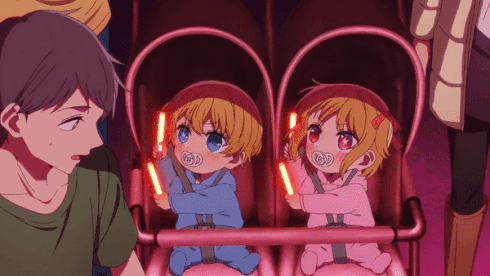
This sounded like a setup for some kind of Spy x Family-like comedy where the two babies with the minds of adults have to keep secret that they’re reincarnated and so forth. Maybe with a dash of Paripi Koumei with ‘unlikely strategist and hopeful young performer’ dynamic. You could easily wring a whole season out of writing scenarios around that premise.
But... hahaha it’s not that at all.
By the end of the first movie-length episode, Ai is killed by the same stalker, who then kills himself. The protagonist convinces himself that the only way the stalker could have known where to find Ai is if her secret lover, the father of the two reincarnation-babies, deliberately leaked her location. So he makes his new mission in life revenge, and we timeskip forward to when the twins - raised by Ai’s producer’s wife - are about to go to high school.
So it’s a revenge drama in a high school setting, right..? You know the type of thing, a class of genius schemers enacting plots against each other..?
No. It’s actually mostly about the entertainment industry.

An episode plot might be, the protagonist reunites with an actress he met on set during his brief stint as a child actor. Realising that it might be an opportunity to get a DNA sample of one of his list of suspects, he gets involved in the shitty TV drama she’s involved in, playing a one-episode antagonist. And despite his ulterior motive, he decides he should do the actress a favour. So, applying his nigh-supernatural analysis skills and willingness to sacrifice his own dignity, he figures out how to elevate the final episode of the production.
His sister meanwhile is dying to become an idol herself. And our ridiculous scheming boy wants to make it happen, despite underlining at every turn how harsh the entertainment industry is for performers. He emotionally manipulates the same actress girl to join.
So it’s actually one of those special-interest anime where the world revolves around one activity, and here that thing is performance (film acting and music). But it’s also a comedy and a ridiculous drama as well. It’s fun.
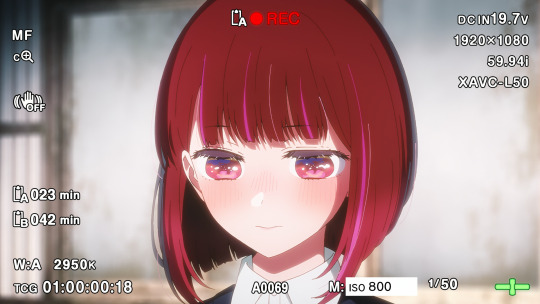
Visually, it’s very shiny. There’s an interesting blend of highly stylised designs for the MCs and other teens, (each MC inherited exactly one of Ai’s six-pointed eye stars and could easily lead a romance manga), and a more realist approach taken with the adults. Are we at last at the peak of eye highlight escalation? Can it go further? It makes effective use of coloured lines; there’s some very strong boards and in general the animation is solid, with moments of real greatness. Shoutout to Kenji Sawada’s excellent depiction of our boy acting as a stalker in episode 4, and whoever animated the uhhh masked strength training youtuber in episode 5. Animating realistic muscles for such a long dance sequence is a hell of a task lmao. (Good ‘long take’ gag too.)
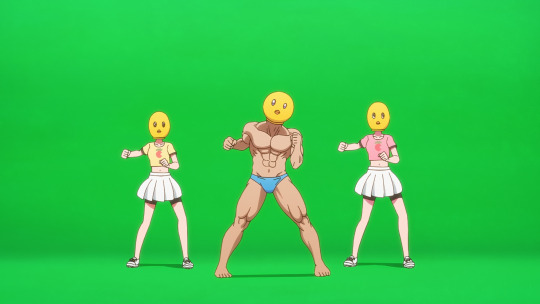
Compared to Paripi Koumei, it has... simultaneously a more grounded view of the entertainment industry as cynical, grubby capitalism. In some ways it’s kind of a tour of the different ways people relate to the industry, the different methods people might pursue to get ahead, and it isn’t just a simple ‘path to success’ sort of thing.
But it’s also a very heightened manga spin on that, with much larger-than-life archetypal characters. It has a bit of a tendency to reiterate and underline what happened and why it’s important to a level that sometimes feels a little much (and now another round of ‘the acting sucked in this TV drama but the last episode was good’), but on the whole, it has momentum, and a talent for coming up with non-obvious scenarios and resolutions. And a great deal of it is about the actual craft of acting; it likes to play up contrast between performances and behind the scenes characterisations, and a lot of time is spent on characters talking about the right way to perform for a particular show.

Anyway, then episode 6 comes along, and things get rather Perfect Blue after the relatively light-hearted previous few episodes. This episode’s plot sees Aqua involved in a dating reality show, but the story mainly revolves around a girl who is pressured into a reckless but ultimately harmless action that gets her hard cancelled online, which she seriously takes to heart and attempts suicide. The whole show uses voiceovers heavily in the classic anime fashion, but in this episode, it’s particularly effective. ‘Storm of cruel social media comments’ is a recurring motif in a lot of anime over the last decade or so, deployed to greater (the end of Devilman Crybaby) or lesser (Belle) effect; here it’s done well, with a lot of care to recreate the UI of various social media sites, and honestly I wasn’t sure if they were going to kill this girl off or not (in the end, Aqua intervenes at the last second).
So where is this going to go in the long run? Its interests are becoming clear, Aqua talks a big game about being hard-headed but just can’t help intervening to help people out of various Situations. But I still have no idea how it will bring it together in the end!
I absolutely need to go back and watch the widely praised adaptation of Kaguya-Sama: Love is War which was by the same mangaka.
The other gift that this series brought is is one of the longest and silliest threads of fansubber drama on the whole of Nyaa, which is really saying something.
24 notes
·
View notes
Note
Wait, no, actually, tell me about the Scribblenauts timeline. I must be real... I like it too. I love unifying timelines where things seemingly just happen, tell us!
scribblenauts fans rise up >:] to be clear this isn't an attempt to sort out the canon timeline [although if you asked i'd guess unlimited > scribblenauts > super > unmasked based on the few splinters of plot we get] but rather taking inspiration from the scraps of story available to build something new and coherent, although at this stage 'coherent' isn't super accurate lmao it's just islands of solid ideas amidst a sea of autism nonsense
basically i'm deciding that the doppelganger's presence in 10-5 of super counts as a plot and slapping that on top of the more consistently defined world and lore of unlimited and onwards [so kind of what unmasked and the subsequent comic did but batman isn't there], with an added sprinkle of the 'scribblenauts being an actual organisation that maxwell is involved in' thing that never made it past background details in the first game. while unlimited arguably has the most iconic and/or existent plot and for sure i want lily to be a deutragonist i'm not sure how much of it i'll retain because 1. turning your daughter into stone is bad parenting 2. let her tag along and be an actual character instead of a literal rock you cowards and 3. the more super-inspired storyline i have in mind with the doppelganger is probably enough to carry the emotional intensity of a mostly lighthearted story by itself and i don't want to bog things down with too many subplots lol
i'm absolutely reading too deep into this kiddie game but i think the doppelganger as an antagonist of maxwell's own creation reflecting all his worst traits would be super interesting in an environment that puts more consistent and deliberate thought into character writing, so that's the idea i'm basing this autism-powered rehash on. i don't think it's ever actually specified but when i was a little sporelet playing scribblenauts unlimited for the first time i somehow got the impression that starites grant wishes? which is cute so i'm using that as maxwell's motivation to join the scribblenauts and seek them out, that he wants to collect enough to wish for something cool and superficial that a 12ish [?????] year old kid would want. but then after lots of adventures and character development when he's in the dramatic final confrontation with his doppelganger and has matured enough to see him as a distressed kid in uniquely terrifying circumstances rather than just an annoying knockoff he instead uses his wish on giving doppelganger the chance to be a normal kid with a normal life because he wants to make kind decisions now. then i guess they all go home and nobody dies in a scripted ufo explosion
this post is getting toooooo long so i'm gonna try and wrap it up now but god i already have so many ideas rattling around my head for an autism reawakening that could be over in a week lmao. now i'm even sadder that my computer is busted because i want to replay unlimited and refresh my lore so badly..... there's a fandom page [breezewiki sweep though] for the series which has helped refresh my memory but none of the sources are cited it's a nightmare. what do you mean maxwell and lily are twins for the love of god give me a single screenshot or manual scan that mentions this
also i didn't have a good place to insert this but even though edgar and julie having 42 kids is obviously a Silly Joke and excuse to give unlimited some unique characters i am choosing to interpret it as them being experienced foster carers. i don't care to sort through every single character and decide which if any are biologically related to each other lmao but adopted/foster families are swag as hell and there should be more of them in media! it also adds a nice layer to the doppelganger plot - maxwell is more willing to reach out to him because he's seen 'angry bitter kid who will only get better with kindness' in a lot of his brothers and maybe himself, and it gives doppelganger an easy place to go for his happy ending because maxwell's parents are experts at taking in kids like him. didn't want to end this post without mentioning this because i'm already suuuper attached to the concept
#[not] sorry for the long ass scribblenauts infodump i just love the goofy noun kids! it may happen again#just fucking whatever#scribblenauts#yeah i'll tag this why not. see if i can get the 3ish active scribblenauts fans to weigh in on my deranged nonsense#also you know how i mentioned in the tags on my last post that one of my overambitious hyperfixation ideas was a super remake#cause initially my idea was that vanilla 5-10 is the 'normal' ending but if you've collected every starite you get this 'good' ending#i dunno that just seems like the kind of slightly annoying design decision that a late 00s ds game would have made hsnbkjndhfhnjj#i'm so normal about this fucking baby puzzle game. can you tell#long post#at least i think it is. i don't use mobile if i can help it#mysthalery
26 notes
·
View notes
Text
I have many thoughts about and related to S3E7 of the Mandolorian. This will probably be more speculative and spoilery than previous episode musings but it is what it is.
The plot seems to have gotten that second cup of coffee finally. I still maintain that the first episode of this season was completely useless and that the third episode was misplaced at best. Bo Katan is doing a speed run of the last time we saw a whole story arc with the Dark Saber (ie Rebels with Sabine). I wonder if Filoni can differentiate any of the characters who are not Ashoka outside of their allegiances sometimes, because there’s a lot of rhyming between series that’s coming up and crossing the border with straight up repetition. At least I don’t hate the characters and while their motives are a little repetitive with previous storylines, Din and Bo Katan’s motives do make sense for them (unlike Ashoka, who doesn’t seem to have one of her own at all).
Grogu fans will be happy to know that he now has a mech suit with “yes” and “no” communication aids and that he is happy to use them. The mech is made out of IG-11 from the first season and I for one would think it pretty ghoulish to be using the remains of a character that everyone seems to see as a friend for this sort of thing. I know people taxidermy their deceased pets and there’s jewelry and objects d’art made with the ashes of loved ones, but this seems way beyond that.
And know for the villainous side of the story: Giancarlos Esposito is way too good of an actor for the series and it is fun watching him eat the scenery. I actively hope that Moff Gideon is the real puppet master for Ashoka because he’s a far better political bad guy than Thrawn (who is best as someone else’s second). Given how much of the clone research seems to fall under Gideon’s purview, how much of Heir to the Empire was centered around trying to clone Force adepts, and given how the general consensus seems to be that the Ashoka series will incorporate chunks of Heir to the Empire in it, Gideon as big bad for that series seems like a better fit than Thrawn. Since no one has seen any TIE Defenders (Thrawn’s canon pet imperial project), I’m going to hope for an imposter pulled up by Moff Gideon until it’s proven otherwise. Gideon smugly asking Captain Pellaeon where Thrawn is in the opening scenes of this episode might be foreshadowing or it could be nothing. But it was also pretty obvious that Pellaeon didn’t know where Thrawn is… but Gideon might.
Reactions to this and the Ashoka trailer seem to fall into a couple of camps. First, those who are raving about the Heir to the Empire trilogy seem to have bought in that this is the real Thrawn coming. They are super excited that one of the best villains in Star Wars is going to show up in live action. There’s excitement that Filoni is doing the thing. Some of these folks have perhaps bought into Filoni’s interpretation of “Thrawn as Moriarty.” But the only character that Filoni seems to care about is Ashoka and Ashoka’s major character problem is that she has no motives of her own and no impact on the Star Wars saga as a whole. That last seems to bother Filoni a lot since he shoehorns Ashoka into everything and she doesn’t really have a development arc of her own.
Second are those (like me) who are also familiar with all the other books where Thrawn appears (the 2017 trilogy, the Ascendacy trilogy, the Hand of Thrawn Trilogy, Outbound Flight) who understand that Thrawn couldn’t politic his way past a ten year old and that more importantly Thrawn knows he can’t politic his way past a ten year old, why the hell would he think of himself as “Heir to the Empire.” Zahn sees Thrawn as “Sherlock on the wrong side” and not Moriarty (this is best seen in Thrawn Alliances with the juxtaposition between him and Vader and furthered in Thrawn Treason). The reactions here have been generally less optimistic and more “uh oh.” Filoni doesn’t seem to do nuanced antagonists, but Zahn absolutely writes Thrawn as multifaceted and perhaps more importantly Zahn writes Thrawn with an understanding that he can absolutely change sides if given the right push and that Thrawn does learn from his mistakes. More significantly, Thrawn tries to fix them when they are brought to his attention (Eli Vanto’s long delayed promotion is a good example). I kind of doubt that’s going to be the case at all given the show runners.
I still want Ar’Alani to show up and kick all the Imperial ass though.
#star wars#the mandolorian#bo katan kryze#baby yoda#grogru#thrawn#thrawn novels#ashoka series#moff gideon#fanboys are exhausting and frustrating#also don’t wear the dead bodies of your friends that’s weird and gross
18 notes
·
View notes
Text
thinking about more character ideas for Robo Sleuths…
They’re a journalist duo named Noodle and Stu (because of course I would name a journalist duo ‘Noodle and Stu’). They could be brothers.
Noodle is the shorter stubbier(?) and more extroverted brother. Stu is the taller lankier introvert brother. They got their names because their hair resembles flat pieces of pasta. Or maybe their parents just hated them idk
The duo is of course at odds with the Robo Sleuths, serving as antagonistic, although not necessarily evil. Two of the cases they (and the Robo Sleuths, separately) are working on are about a woman named Helen and Lucy.
Helen is also a new character. She’s a soft spoken shy character with a sort of bumblebee aesthetic, and in stark contrast to her, her family is related to some big crime group. I haven’t come with what the crime is specifically since I don’t want it to be another mafia. (Maybe it’s some faulty religious group… or maybe a cult?)
Noodle was mostly the one with the idea to investigate her family (his motives I also don’t know yet) and is pretty much always the one who pesters her, whether that be directly or by secretly trying to get info from her (it always fails). But after spending more time with her he slowly realizes the error of his ways, which helps improve how he solves cases in the future.
Lucy, on the other has popped up before. She was the ‘gardener with a secret’ from the last character dump. She is also being investigated for… something. Knowing her it was probably murder.
She is also bad at keeping her cool, and often slips up. But Noodle and Stu are so stupid that they rarely realize it.
She also mistakes Stu’s investigations and interviews as flirting, which makes keeping her cool way harder. (Does it eventually become flirting? Yes.)
Also, I want to clarify that though there is a quite a bit of evidence against her that she may not actually be the culprit. It’ll either be because there’s a vital missing piece of evidence, or that the journalists (and heck, the detectives) have been interpreting all the evidence in the wrong way and getting plot holes.
I am definitely going to do some sketching to flesh out these ideas! But let me know what you think about them so far, if you’d like. :)
And if you’ve made it this far I’d like to add: if this were an actual series, the introduction of new characters or plot points would mark a new episode (if it’s the same day or at least generally the same time, they’re from the same new ‘episode’). I think this counts as episode 5? Since so far there’s been
Intro of the Robo Sleuths and some Minor Characters (Jan)
Intro of Rod and Veronica (Jan-Feb)
Development of Rod and Veronica 1 (Feb)
Enid and Lou Development & Character Dump 1 (Late March) ((Maybe could be split into two halves?))
Character “Dump” 2 (April)
[I always seem to pick up the series around the 5th of every month.]
#Also my stomach is cramping too much and the sun rose. I will NOT be going back to sleep#As for the characters I plan on trying to make a lawyer and a forensics officer for the series next!#text post#long post#character development#character ideas#series development#series idea#robo sleuths: robot detectives#oc noodle#oc stu#oc helen#oc lucy
2 notes
·
View notes
Text
Circe by Madeline Miller: a review

As you might have noticed, a few of my most recent posts were more or less a liveblog of Madeline Miller’s novel Circe. However, as they hardly exhausted the subject, a proper review is also in order. You can find it under the “read more” button. All sorts of content warnings apply because this book takes a number of turns one in theory can expect from Greek mythology but which I’d hardly expect to come up in relation to Circe. I should note that this is my first contact with this author’s work. I am not familiar with Miller’s more famous, earlier novel Song of Achilles - I am not much of an Iliad aficionado, truth to be told. I read the poem itself when my literature class required it, but it left no strong impact on me, unlike, say, the Epic of Gilgamesh or, to stay within the theme of Greek mythology, Homeric Hymn to Demeter, works which I read at a similar point in my life on my own accord.
What motivated me to pick up this novel was the slim possibility that for once I’ll see my two favorite Greek gods in fiction, these being Hecate and Helios (in case you’re curious: #3 is Cybele but I suspect that unless some brave soul will attempt to adapt Nonnus’ Dionysiaca, she’ll forever be stuck with no popcultural presence outside Shin Megami Tensei). After all, it seemed reasonable to expect that Circe’s father will be involved considering their relationship, while rarely discussed in classical sources, seems remarkably close. Hesiod’s Catalogue of Women and Apollonius’ Argonautica describe Circe arriving on her island in her father’s solar chariot, while Ptolemy Hephaestion (as quoted by Photius) notes that Helios protected her home during the Gigantomachy. Helios, for all intents and purposes, seems like a decent dad (and, in Medea’s case, grandpa) in the source material even though his most notable children (and granddaughter) are pretty much all cackling sorcerers, not celebrated heroes. How does Miller’s Helios fare, compared to his mythical self? Not great, to put it lightly, as you’ll see later. As for Hecate… she’s not even in the book. Let me preface the core of the review by saying I don’t think reinterpreting myths, changing relations between figures, etc. is necessarily bad - ancient authors did it all the time, and modern adaptations will inevitably do so too, both to maintain internal coherence and perhaps to adjust the stories to a modern audience, much like ancient authors already did. I simply don’t think this book is successful at that. The purpose of the novel is ostensibly to elevate Circe above the status of a one-dimensional minor antagonist - but to accomplish this, the author mostly demonizes her family and a variety of other figures, so the net result is that there are more one dimensional female villains, not less. I expected the opposite, frankly. The initial section of the novel focuses on Circe’s relationship with her family, chiefly with her father. That’s largely uncharted territory in the source material - to my knowledge no ancient author seemed particularly interested in covering this period in her life. Blank pages of this sort are definitely worth filling. To begin with, Helios is characterized as abusive, neglectful and power-hungry. And also, for some reason, as Zeus’ main titan ally in the Titanomachy - a role which Hesiod attributes to Hecate… To be fair I do not think it’s Hesiod who serves as the primary inspiration here, as it’s hard to see any traces of his account - in which Zeus wins in no small part because he promises the lesser titans higher positions that they had under Cronus - in Miller’s version of events. Only Helios and Oceanus keep their share, and are presented as Zeus’ only titan allies (there’s a small plot hole as Selene appears in the novel and evidently still is the moon…) - contrary to just about any portrayal of the conflict, in which many titans actually side with Zeus and his siblings. Also, worth noting that in Hesiod’s version it’s not Oceanus himself who cements the pact with Zeus, it’s his daughter Styx - yes, -that- Styx. Missed opportunity to put more focus on female mythical figures - first of many in this work, despite many reviews praising it as “feminist.” Of course, it’s not all about Helios. We are quickly introduced to a variety of female characters as well (though, as I noted above, none of these traditionally connected to the Titanomachy despite it being a prominent aspect of the book’s background). They are all somewhat repetitive - to the point of being basically interchangeable. Circe’s mother is vain and cruel; so is Scylla. And Pasiphae. There’s no real indication of any hostility between Circe and any of her siblings in classical sources, as far as I am aware, but here it’s a central theme. The subplots pertaining to it bear an uncanny resemblance to these young adult novels in which the heroine, who is Not Like Other Girls, confronts the Chads and Stacies of the world, and I can’t shake off the feelings that it’s exactly what it is, though with superficial mythical flourish on top. I should note that Pasiphae gets a focus arc of sorts - which to my surprise somehow manages to be more sexist than the primary sources. A pretty famous tidbit repeated by many ancient authors is that Pasiphae cursed her husband Minos, regarded as unfaithful, to kill anyone else he’d have sex with with his… well, bodily fluids. Here she does it entirely because she’s a debased sadist and not because unfaithfulness is something one can be justifiably mad about. You’d think it would be easy to put a sympathetic spin on this. But the book manages to top that in the very same chapter - can’t have Pasiphae without the Minotaur (sadly - I think virtually everything else about Pasiphae and Minos is more fun than that myth but alas) so in a brand new twist on this myth we learn that actually the infamous affair wasn’t a curse placed on Pasiphae by Poseidon or Aphrodite because of some transgression committed by Minos. She’s just wretched like that by nature. I’m frankly speechless, especially taking into account the book often goes out of its way to present deities in the worst light possible otherwise, and which as I noted reviews praise for its feminist approach - I’m not exactly sure if treating Pasiphae worse than Greek and Roman authors did counts as that. I should note this is not the only instance of… weirdly enthusiastic references to carnal relations between gods and cattle in this book, as there’s also a weird offhand mention of Helios being the father of his own cows. This, as far as I can tell, is not present in any classical sources and truth to be told I am not a huge fan of this invention. I won’t try to think about the reason behind this addition to maintain my sanity. Pasiphae aside - the author expands on the vague backstory Circe has in classical texts which I’ve mentioned earlier. You’d expect that her island would be a gift from her father - after all many ancient sources state that he provided his children and grandchildren with extravagant gifts. However, since Helios bears little resemblance to his mythical self, Aeaea is instead a place of exile here, since Helios hates Circe and Zeus is afraid of witchcraft and demands such a solution (the same Zeus who, according to Hesiod, holds Hecate in high esteem and who appeared with her on coins reasonably commonly… but hey, licentia poetica, this idea isn’t necessarily bad in itself). Witchcraft is presented as an art exclusive to Helios’ children here - Hecate is nowhere to be found, it’s basically as if her every role in Greek mythology was surgically removed. A bit of a downer, especially since at least one text - I think Ovid’s Metarphoses? - Circe directly invokes Hecate during her confrontation with king Picus (Surprisingly absent here despite being a much more fitting antagonist for Circe than many of the characters presented as her adversaries in this novel…) Of course, we also learn about the origin of Circe’s signature spell according to ancient sources, changing people into animals. It actually takes the novel a longer while to get there, and the invented backstory boils down to Circe getting raped. Despite ancient Greek authors being rather keen on rape as plot device, to my knowledge this was never a part of any myth about Circe. Rather odd decision to put it lightly but I suppose at least there was no cattle involved this time, perhaps two times was enough for the author. Still, I can’t help but feel like much like many other ideas present in this book it seems a bit like the author’s intent is less elevating the Circe above the role of a one note witch antagonist, but rather punishing her for being that. The fact she keeps self loathing about her origin and about not being human doesn’t exactly help to shake off this feeling. This impression that the author isn’t really fond of Circe being a wacky witch only grows stronger when Odysseus enters the scene. There was already a bit of a problem before with Circe’s life revolving around love interests before - somewhat random ones at that (Dedalus during the Pasiphae arc and Hermes on and off - not sure what the inspiration for either of these was) - but it was less noticeable since it was ultimately in the background and the focus was the conflict between Circe and Helios, Pasiphae, etc. In the case of Odysseus it’s much more notable because these subplots cease to appear for a while. As a result of meeting him, Circe decides she wants to experience the joys of motherhood, which long story short eventually leads to the birth of Telegonus, who does exactly what he was famous for. The final arcs have a variety of truly baffling plot twists which didn’t really appeal to me, but which I suppose at least show a degree of creativity - better than just turning Helios’ attitude towards his children upside down for sure. Circe ends up consulting an oc character who I can only describe as “stingray Cthulhu.” His presence doesn’t really add much, and frankly it feels like yet another wasted opportunity to use Hecate, but I digress. Oh, also in another twist Athena is recast as the villain of the Odyssey. Eventually Circe gets to meet Odysseus’ family, for once interacts with another female character on positive terms (with Penelope, to be specific) and… gets together with Telemachus, which to be fair is something present in many ancient works but which feels weird here since there was a pretty long passage about Odysseus describing him as a child to Circe. I think I could live without it. Honestly having her get together with Penelope would feel considerably less weird, but there are no lesbians in the world of this novel. It would appear that the praise for Song of Achilles is connected to the portrayal of gay relationships in it. Can’t say that this applies to Circe - on this front we have an offhand mention of Hyacinth's death. which seems to serve no real purpose other than establishing otherwise irrelevant wind god is evil, and what feels like an advert for Song of Achilles courtesy of Odysseus, which takes less than one page. Eventually Circe opts to become mortal to live with Telemachus and denounces her father and… that’s it. This concludes the story of Circe. I don’t exactly think the original is the deepest or greatest character in classical literature, but I must admit I’d rather read about her wacky witch adventures than about Miller’s Circe. A few small notes I couldn’t fit elsewhere: something very minor that bothered me a lot but that to be honest I don’t think most readers will notice is the extremely chaotic approach to occasional references to the world outside Greece - Sumer is randomly mentioned… chronologically after Babylon and Assyria, and in relation to Persians (or rather - to Perses living among them). At the time we can speak of “Persians” Sumerian was a dead language at best understood by a few literati in the former great cities of Mesopotamia so this is about the same as if a novel about Mesopotamia mentioned Macedonians and then completely randomly Minoans at a chronologically later point. Miller additionally either confused or conflated Perses, son of Perseus, who was viewed positively and associated with Persia (so positively that Xerxes purportedly tried to use it for propaganda purposes!) with Perses the obscure brother of Circe et. al, who is a villain in an equally obscure myth casting Medea as the heroine, in which he rules over “Tauric Chersonese,” the Greek name of a part of Crimea. I am honestly uncertain why was he even there as he amounts to nothing in the book, and there are more prominent minor children of Helios who get no mention (like Aix or Phaeton) so it’s hard to argue it was for the sake of completion. Medea evidently doesn’t triumph over him offscreen which is his sole mythical purpose. Is there something I liked? Well, I’m pretty happy Selene only spoke twice, considering it’s in all due likeness all that spared her from the fate of receiving similarly “amazing” new characterization as her brother. As is, she was… okay. Overall I am definitely not a fan of the book. As for its purported ideological value? It certainly has a female main character. Said character sure does have many experiences which are associated with women. However, I can’t help but think that the novel isn’t exactly feminist - it certainly focuses on Circe, but does it really try to “rehabilitate” her? And is it really “rehabilitation” and feminist reinterpretation when almost every single female character in the book is the same, and arguably depicted with even less compassion than in the source material? It instead felt like the author’s goal is take away any joy and grandeur present in myths, and to deprive Circe of most of what actually makes her Circe. We don’t need to make myths joyless to make them fit for a new era. It’s okay for female characters to be wacky one off villains and there’s no need to punish them for it. A book which celebrates Circe for who she actually is in the Odyssey and in other Greek sources - an unapologetic and honestly pretty funny character - would feel much more feminist to me that a book where she is a wacky witch not because she feels like it but because she got raped, if you ask me.
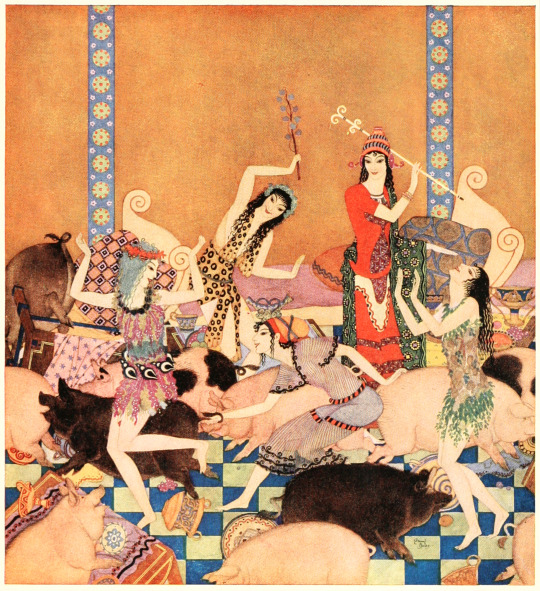
Circe evidently having the time of her life, by Edmund Dulac (public domain)
43 notes
·
View notes
Text
A REVIEW: Scum Villain’s Self Saving System (MXTX)

I. GENERAL OVERVIEW
LENGTH: 81 Chapters and 20 Extras
GENRE: (BL) Chinese Cultivation Novel - Historical Period
MAIN COUPLE: Luo Binghe and Shen Qingqiu
BRIEF SUMMARY: After binge reading legendary harem stallion web novel “Proud Immortal Demon Way”, Shen Yuan (a millennial increasingly frustrated by the story’s outrageous and senseless plot) dies choking on food and transmitigates into the novel... as the villain shizun of the main protagonist, Shen Qingqiu. Shen Yuan, now Shen Qingqiu, must navigate through the original PIDW’s plot points to gain the favor of the original protagonist, Luo Binghe, to avoid being tortured and cut into a human stick. However, in doing so, Shen Qingqiu eventually finds that the original plot changes, awakening new feelings in the protagonist previously unexplored.
II. CATEGORICAL RANKING & BREAKDOWN
This was my second danmei novel I had ever read, and one that really helped. familiarize me with the ins and outs of the typical cultivation novel tropes. With Shen Qingqiu’s unfortunately relatable inner monologging complete with millennial, largely inappropriate vocabulary AND emoticons was undeniably very entertaining, and I spent the majority of the book laughing along with his misfortune. It was a book in which the reader got to experience the stereotypical romance, adventure, and fantasy tropes through the lens of a character living out these tropes with a mindset not so dissimilar from our own. With that, let’s move on to my personal categorical rankings for this novel.
1. CHARACTERIZATION ~ Rated 7/10
With every single character within this book, I can confidently say I really liked their characterization. Each character’s personality was constructed in a way that did not adhere to one stereotype, and the interactions between characters never felt stale or forced (especially in a book where Shen Qingqiu has a sudden change in personality, I was worried these interactions with characters such as Yue Qingyuan and Liu Qingge would be strange, but it was indeed quite cute and funny). Even with the minor characters that seemed to be the main antagonists Tianlang Jun, their characterizations and relationship still had a familial sense of warmth that made them feel a lot more human. However, due to the length of the book, not all the side characters were really flushed out in terms of backstory.
With the main protagonist, Luo Binghe, as to deviate from the original “black hearted protagonist” of PIDW, his back story and past abuses led to his motivations as a person being a lot more complex, deeper, and especially tragic. Through the novel we are able to see that the original protagonist crafted from resentment started out as a boy too naive, with a heart full of warmth and kindness, only to be bludgeoned and abandoned over and over again. Even by the end of the book, in interactions with Shen Qingqiu, we can still evidently see Luo Binghe’s past emotional trauma within his feelings of inadequacy and his villainization at the peak. I personally really liked this new depth of character that gave me a new perspective on his actions and motivations. Generally, I also love the change in Binghe’s demeanor when he’s around Shen Qingqiu vs. anyone else, and one can easily forget how manipulative, cunning, and overpowered he is as the “protagonist”. He is endearing and I love him so much, but that’s deviating from the original point.
As discussed previously, Shen Qingqiu’s character, while having a. fairly distinct personality, is almost a self-insert character that the reader can. project on directly. While I THOROUGHLY enjoyed his narration throughout (which served as much needed comic relief), I personally wished there to be a little more character development, especially regarding the paradigm shift that occurred in his mindset and attitude towards the other characters in the book. At the beginning of the novel, there is a certain subconscious wall Shen Qingqiu creates, where he thinks of the other people as strictly “character from PIDW with concrete fates and personailites”, which is especially evident in the way he treated Luo Binghe post-Immortal alliance conference. But overtime, there is a subtle shift in which by the end of the book, we see Shen Qingqiu resolve some misunderstandings (to an extent) and see him start to regard the characters around him as true people that he can build deep relationships with. I personally wanted this aspect to be highlighted a little more and that this had good potential in being an essential piece of plot could have led to more resolution (discussed below).
2. WORLD BUILDING ~ Rated 9/10
From my perspective, especially in cultivation novels, world building becomes exceedingly important in order to aid the reader in understanding the power structure and dynamic of the cultivation world, which reflects in the interactions between characters of different factions. Because of Shen Qingqiu’s commentary as a “reader of PIDW”, I felt the author was able to do a stellar job in explaining the different dynamics within the sect and between the different peak lords, as well as major conflicts between demons. Hence, it was really easy to understand and follow how the world revolved around each of the conflicts, as well as justify some of the characters’ motivations within SVSSS.
3. PLOT DEVELOPMENT ~ Rated 8/10
What I found extremely compelling about the plot of this book in particular is that it is a lot more complex and darker than the audience originally grasps. With my first read, I found the book hilarious through and through, and couldn’t get enough of the comedic aspects and commentary that seemed to seep through to even the most serious moments. But as I started to think back on some of the events that ended up transpiring, I came to the realization that the plot itself is extremely tragic. If one were to think about the book from Luo Binghe’s perspective, as a child abandoned with no one to care for and love him, to then finding someone who cherishes him and believes in him, only to have that very same person push him off a cliff and have him experience hell for the next 5 years; frankly the plot is really devastating. That’s also what makes it such an interesting book to read and then reread.
Another aspect of the plot that is notable is how outrageous some of the events are, especially when thinking from a logical perspective. From Shen Qingqiu dying and growing a new body underground, to the thousands of elephant demons (?) that Luo Binghe gathers, one is simply overwhelmed by how random the book is sometimes. Even better, we get to witness this exact reaction through Shen Qingqiu, as someone to transmitigated into this nonsensical book. Hence, somehow the book manages to be completely unrelatable, yet also very relatable, hitting both extremes in a perfect equillibrium.
My main reservation/criticism of the plot is personally~ I felt that it lacked a little bit of resolution in some of the major plot points, such as “Bingge”, as well as the Bingqiu relationship. A lot of the original misunderstandings and misgivings between Shen Qingqiu during and after the 5 years (pre-relationship) weren’t really resolved. It sort of left me wanting some more development from Binghe where his is able to heal from his past to a certain extent. Regarding Shen Qingqiu, I also wanted to see more development with him in terms of his obvious shift in mindset from viewing the people around him as characters from the original PIDW, to actual people whose fates aren’t predetermined. It could be a fun idea to explore more. But these are just small things that really don’t take away from the experience that is reading SVSSS.
III. FINAL THOUGHTS
RECOMMENDATION: YES I DO RECOMMEND IT , especially for people who enjoy comedy, modern humor mixed with ridiculous xianxia plot points, and an action filled BL cultivation novel. It really is an absolute joy to read and all the characters are so endearing in their own way - Luo Binghe with his selective duality and various complexes, Shen Qingqiu with his alleged “straigtness” and internalized heteronormativity, Tianlang Jun with his desire to be a malewife, the misunderstandings in the relationship between Shen Qingqiu and Zhuzhi Lang, etc. etc. It is really a fun read and I thoroughly enjoyed it. This concludes my first casual book review haha.
#danmei#mxtx#mxtxnovel#svsss#scumvillainsselfsavingsystem#shenqingqiu#shen qingqiu#luo binghe#book review#hanashonestreviews
49 notes
·
View notes
Text
Hordak can’t catch a break even on his birthday...
Oh fandom, you really like this sort of drama don’t you?
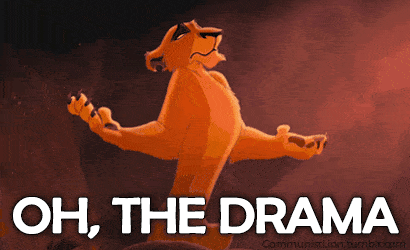
A few days ago, on Hordak’s birthday, there was this ‘interesting’ post in the tag – since, apparently it’s impossible to get any peace even on that day.
I was too tired to answer it at the time after being on call the day before so, here’s my delayed answer to all of that:
First off: this post has this bit in it when asked what that person dislikes about SPOP.
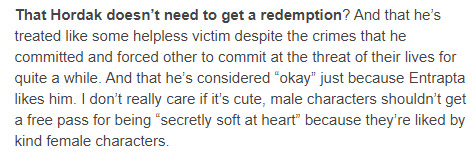
He doesn’t need to get a redemption and he doesn’t get one in the show.
None of his actions constitute a redemption arc. The man merely acknowledged his personhood and freed himself from his master and God. That’s what his arc was about: the right to have a personal identity.
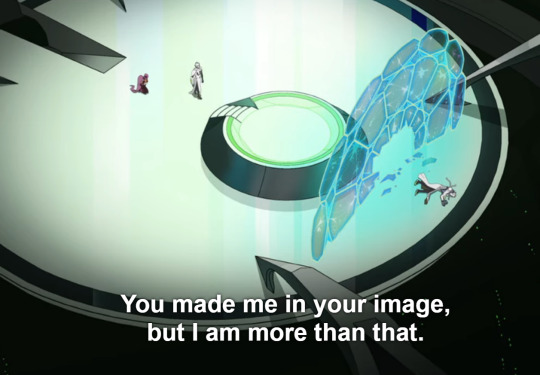
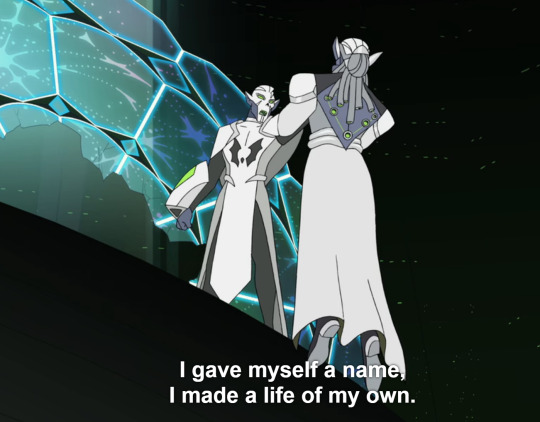
He gave himself a name and wanted to be his own person. That’s it. That’s all he wanted.
The man was merely freed from Prime’s influence- an influence he was born into since he’s been specifically manufactured to serve as a disposable mass produced soldier and worshipper of Prime.
If the argument that Catra was “forced” to commit crimes and thus she is not completely guilty of them since she was under duress – then the argument doubly holds for a person who has been directly programmed and conditioned to do so under the threat of death or mental rape (purification).\
Even while away from Prime, he was still conditioned to obey and brainwashed by Prime’s cult. He literally knew nothing else – he was not meant to. It’s how indoctrination works.
Prime’s clones aren’t people to Prime, they are tools. Those clones, while cut off from Prime still want to serve and please him: That’s what Wrong Hordak’s purpose in the show is- to show us just that.
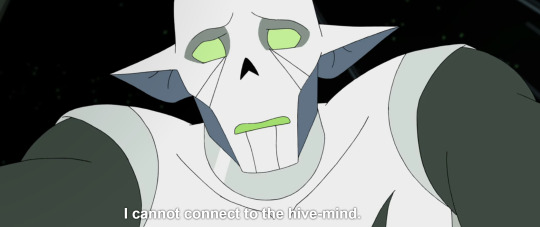
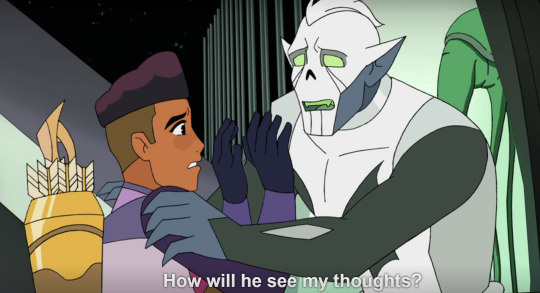
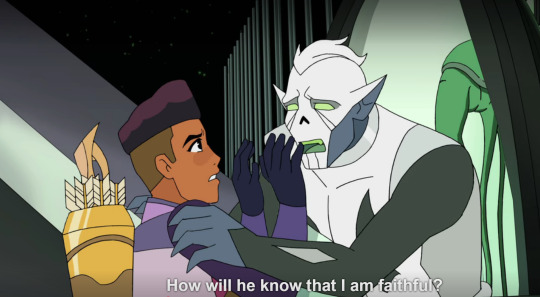
Hordak is not considered “OK” because Entrapta likes him. Hordak is merely shown – by Entrapta that he could live apart from his cult and have worth outside what Prime tells him he has.
Just like real life cult victims, he needs an outsider to help him see a way out of the cult. The nature of indoctrination and brainwashing makes it impossible for the brainwashed person to know they are brainwashed unless someone points it out.
Now for my favorite thing:

and

oh and

Oh boy… this makes me just so damn uncomfortable.
To offer a bit of context as to why. I have never been on social media before SPOP or in any fandom and as such, I have never encountered the ‘all men are evil’ discourse that seems to infest these places. It’s been quite a bit of culture shock for me.
What is it that makes anyone think it is ok to judge a person because of an accident of birth? (being born male)
Why does hate for 50% of the human population get such a free pass on these platforms? Misandry is just as terrible as misogyny. You are being biased against another human because of their gender. I don’t care that males are perceived as ‘privileged’ – that doesn’t make it ok to be terrible to them unprovoked.
How does hating all men help achieve equity?
Do you realize that this sort of discourse is exactly how you radicalize people against the very cause you are championing? You breed hate and adversity for the rest of us who actually want to to have a discussion on the topic.
I’m a feminist myself (in a country where feminism is hard-work) and let me tell you, making all men hate us does nothing but push away potential allies and make it a lot harder for our voices to be heard.
Feminism is about equality, not women dominating.
Now onto the second post: the one comparing Catra and Hordak with the question of which of them is a better person.

This whole war orphans that were personally abducted and tortured into serving the horde HC that some ppl have is really starting to get boorish. This has been going on for more than 6 months.
I have no idea why everyone thinks he went down chimneys and stealing babies left and right while cackling villainously. The man had a busy schedule of brooding in his lab, wallowing at his inability to use insulated cables and having his device blowing up in his face with the occasional Skype call to Shadow Weaver to see what the Horde is doing.
And yet, to a part of the fandom, this is what he looked like:
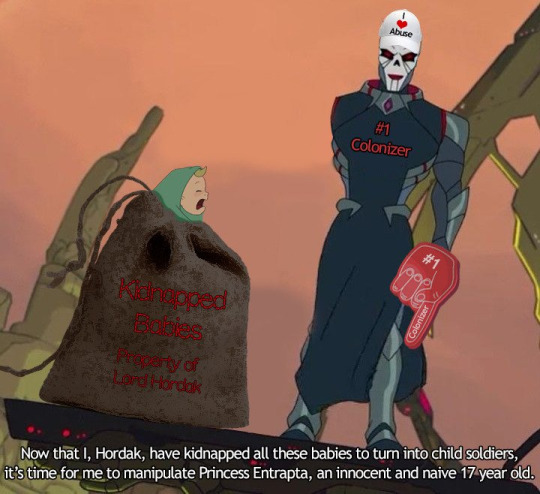
( @bat-burrito made this one and it’s glorious)
And if you don’t believe me about the lab recluse thing, you don’t have to, the show pretty much states it for me.
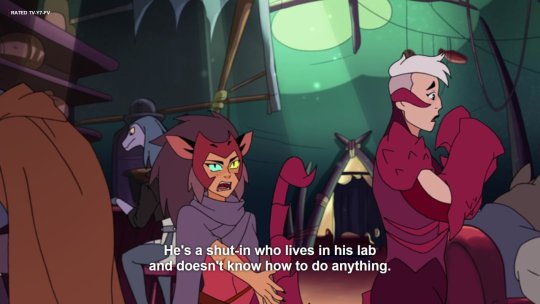
and
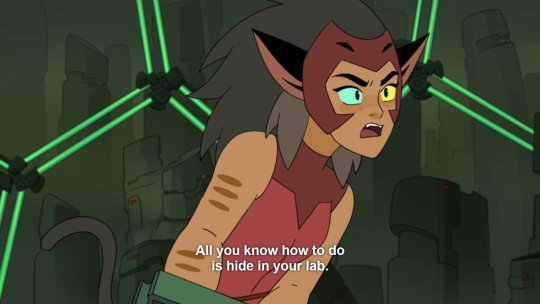
+
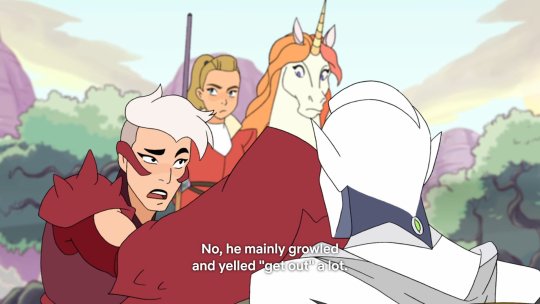
Hordak is a recluse that stayed in his lab and let the running of the Horde and most operations to Shadow Weaver and later Catra. He did not personally abuse anyone and he is not the origin of the cycle of abuse.
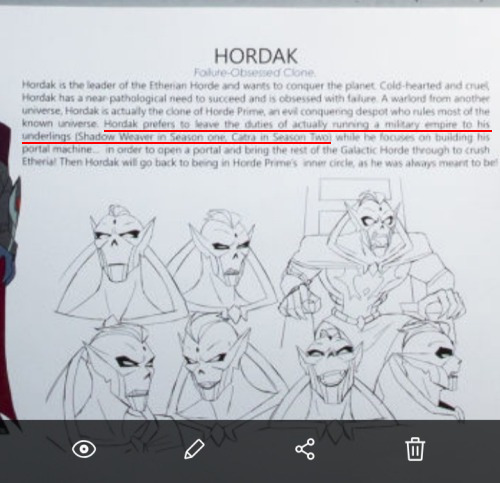
Shadow Weaver was a child grooming manipulative woman before she even joined the Horde – she did this to Micah while she was not “evil” or presumably abused by Hordak.
Even if you want to HC that Hordak abused her somehow, he is still not the one who started the cycle: Horde Prime is.
The whole fandom seems to forget about the eldritch monstrosity that created a whole army of brainwashed slaves to worship and die for him. Prime is the one that sent Hordak to die and gave him the motivation to try to prove himself worthy of life and love. If you want to point fingers, point them at the origin of all of this. This fandom has a strange Prime blindness. He is never talked about when it comes to being the start of all of this.
If Prime didn’t exist, Hordak wouldn’t exist. If Prime hadn’t sent Hordak off to die, then his clone wouldn’t have accidentally ended up on Etheria. None of the things in the show would have happened.
Adora would have died of exposure in a field, the monarchies on Etheria would have continued as they are and the planet would have continued to exist in despondos.

He is a dictator, yes. So are the princesses. Monarchies are dictatorships where the ruler is born into power. Hordak gained his through military might while Glimmer was born with hers and enforced it with tradition. I don’t really care to play “who’s the better dictator”. The princesses have their power because of the runestones- magical rocks put there by the First Ones to channel the planet’s magic and use it as a weapon. How come no one talks about that?
Do you think a king/queen keeps their crown without effort or subjugation of their subjects?
Also, Hordak had never interacted with Catra before SW dragged her before him to be judged. He was indifferent to etherians in general and didn’t seem to care which of them were his underlings so long as the operations were running smoothly. He was more focused on his portal and returning home than on anything else. He did not set out to “ruin lives” or quest for power. What he wanted was to return to his deity and become a mindless part of the whole again – that is as opposite to power hungry as you can get.
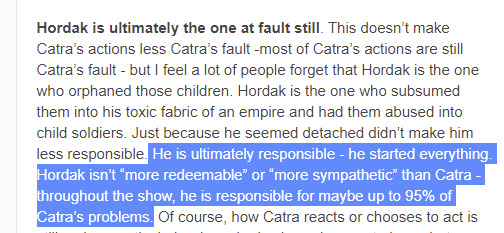
Catra was directly abused by Shadow Weaver throughout her childhood. That makes Shadow weaver responsible for 100% of that abuse.
Catra was found in a box by Adora and adopted by Shadow Weaver. Hordak didn’t know or care that she existed.
He is responsible for the war, he is responsible for the war casualties and the property damage. He is not responsible for Shadow Weaver being a terrible person and mother figure.
Again with the orphan thing. We have 5 cadets in the show.
Adora was found in a field.
Catra was found in a box. Lonnie, Kyle and Rogelio are unexplained. The only lizard ppl we see in the show are in the Horde or the Crimson Wastes. The other two could just as well be the children of some of the soldiers.

I may harp on about what a bitch Shadow Weaver is – the reason I do so is because she is legitimately terrible to the two girls in her care.
I was the unfavorite growing up, I WAS the Catra in my family who could do no right while my sibling was the golden child. I don’t however hate Shadow Weaver. She is a cartoon character in a show and she does the things she was written to do. Hell, she is a very compelling and believable villain. Her motivations are clear and she is consistent. Her voice actress portrayed her splendidly and her character design is superb. I like her but that doesn’t mean that I don’t acknowledge her role in the story. I don’t however make up parts of the story to make her more evil than she was or treat my headcanons about her as absolute fact.
Again, sigh: Prime is the worst villain in the show. He is quite literally Nyarlathotep and does this to planets:
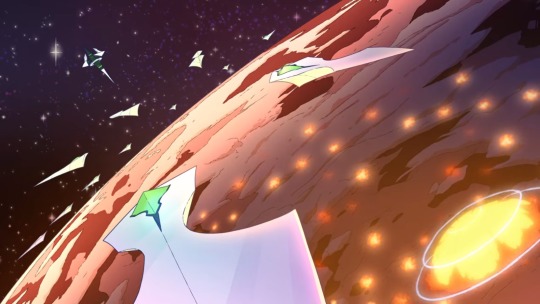
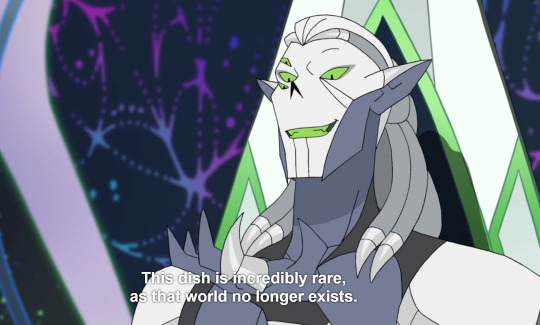
This to people:
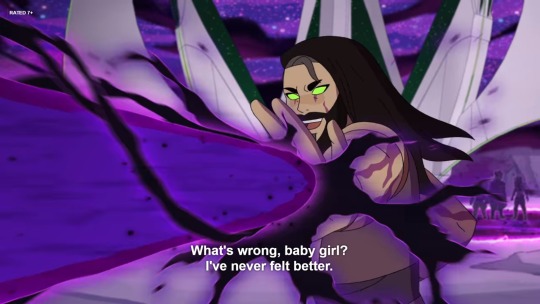
and this to the people he created to serve, worship and love him:
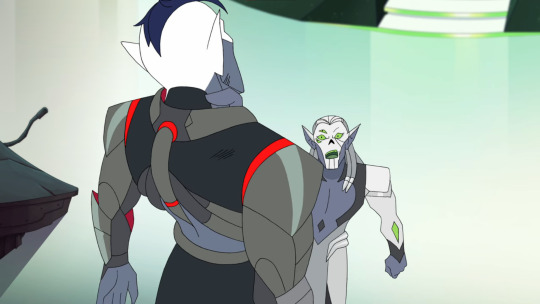
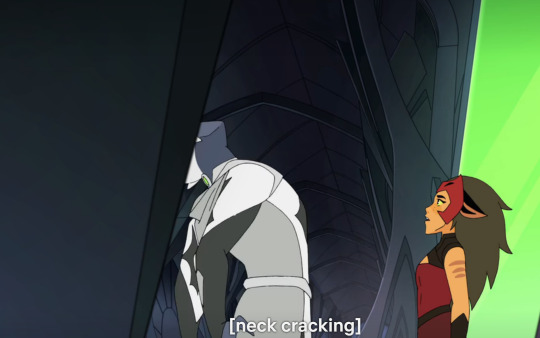
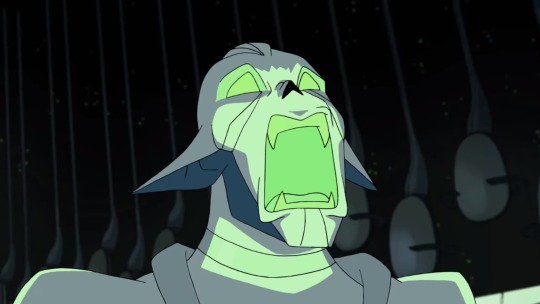
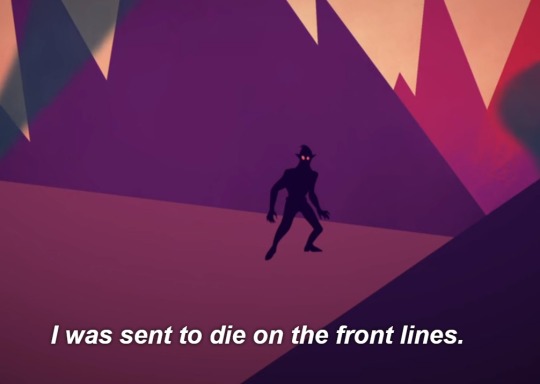
How is that not worse?

I love Catra and it genuinely annoys me when people erase her agency or try to paint her as one-dimensional victim. Catra was an antagonist for most of the show and she rocked it! She was 400% more efficient at it than cloneboy. Give the queen some damn respect and recognition! Catra had a lot of agency and her actions moved the plot of the show more than those of the protagonists. (they were mostly reactive).
Catra pulled the lever of the portal in a moment of distress after a breakdown, a Shadow-Weaver related breakdown because that’s how trauma works.
Hordak didn’t make her do it, he didn’t send Catra after Adora either. These were Catra’s choices. They came from a place of hurt but they were her choices still.
The portal was a means of transportation, not a weapon. Building it was not Catra’s mission, it was Hordak’s. He built it so he could contact Prime and either summon him here or go home –whichever course of action Prime wanted. Again, Hordak wanted to go back to this:
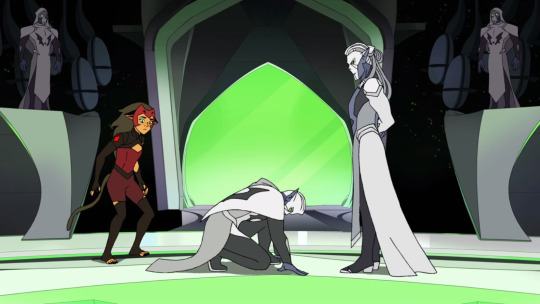
...
The only person who knew the device was dangerous was Entrapta and she tried to warn Hordak about it. Catra was the one who stopped her, violently so, then sent her to die on Beast Island- the fate Entrapta saved her from a season ago. Catra then tried to have Hordak open the portal before it was ready.
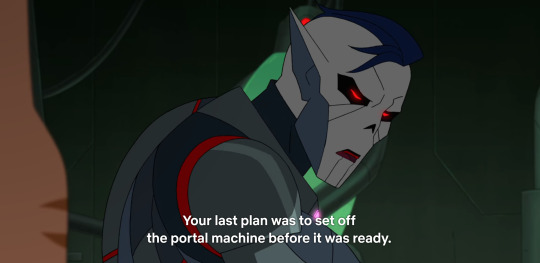
When he wouldn’t – she pulled the lever herself because that is how desperate she had gotten at that point, to show Shadow Weaver how wrong she was. That is how hurt Catra was by her mother figure’s betrayal and abuse.
Don’t take that away from her. Don’t call it curiosity or naivete or whatever. She knew the portal was dangerous but she wanted to prove Shadow Weaver wrong so badly that she didn’t care at that point. She had been pushed that far.
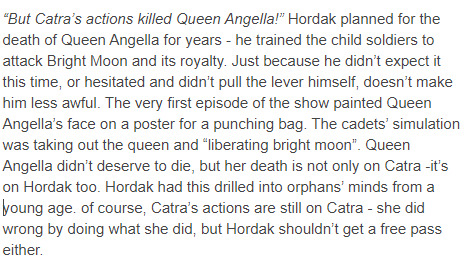
Catra’s actions led to Angella’s death but she was not directly responsible for it. She didn’t activate the device to kill Angella, it merely happened accidentally. Catra was however glad it happened and wanted to profit from the aftermath of her death.
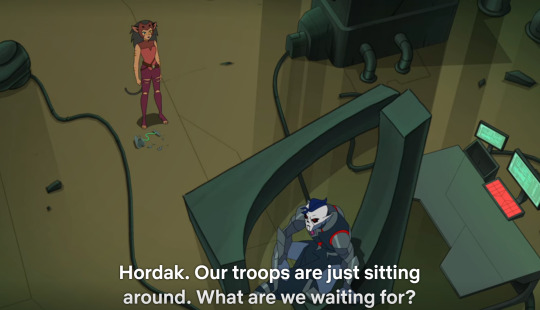
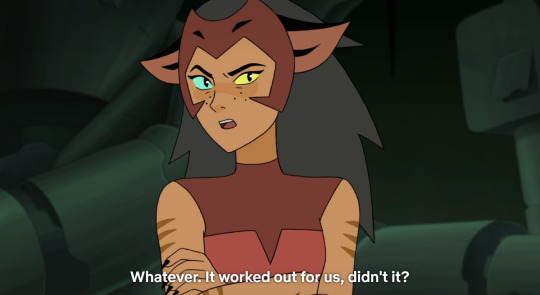
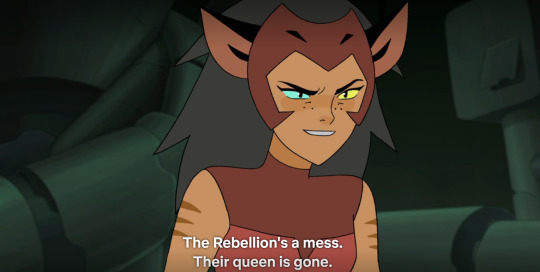
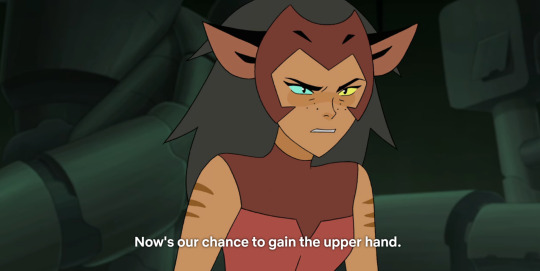
Hordak didn’t care or plan to kill Angella personally. There is no in-show moment where any of that is portrayed. Since he doesn’t care about the specifics of running the horde seem to know what they are conquering at the moment, it seems that that was usually a task reserved for his second in command.
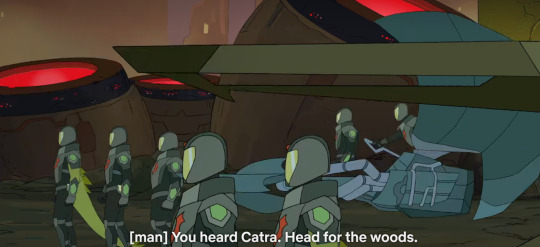
^ - troop movement ordered by Catra
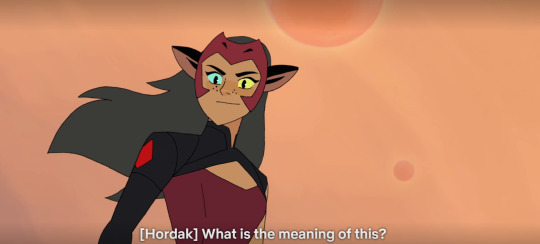


Hordak doesn’t even know what his own army is doing.

Again with the Hordak “drilling into orphan’s minds”… I seriously doubt that any of them had ever seen him out of his lab or that he came up with the propaganda himself.
Manipulation is more Shadow Weaver’s game not his. For all of Hordak’s faults, he is not deceptive or manipulative. If anything, he is woefully incapable of spotting lies. (it might have something to do with him being born in a society where lies were almost impossible because of the hive mind and Prime being able to browse his thoughts at a whim- as such, it wouldn’t be a skill he would have been able to develop).
Hordak canonically despises deception and lies. I really don’t understand where this image of a manipulative and cunning Hordak comes from. He wouldn’t be able to plot himself out of a paper bag if his life depended on it.
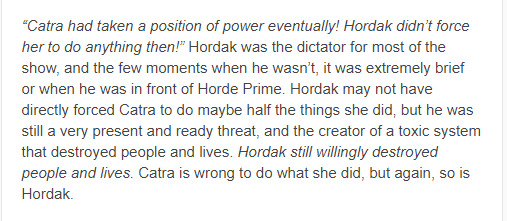
First off.. S4 Catra was his equal, not his subordinate. Don’t take that away from her. She earned it.
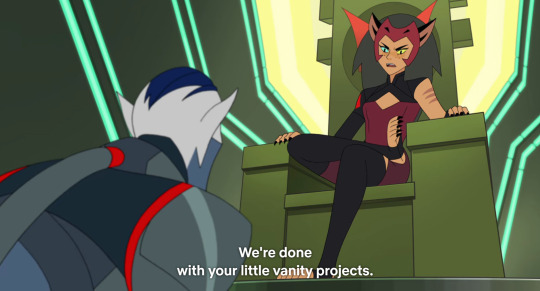
He doesn’t look that threatening here...
And again: Prime created the system. He made clone slaves and programmed them to serve. His clones have hardware installed for the express reason to facilitate his control over them. He has a religion in place to make sure their thoughts do not stray from his purpose. I am legitimately boggled by this fandom’s tendency to completely forget about his existence.Does anyone really think that these people that are born “prechipped” and programmed to know nothing but Prime’s Light are really knowledgeable about human morality?
That they would know that conquest is bad when that is the express reason for their creation?
If I were born in that situation, I’m not sure I would have known any better. Hell, if any of the clones even try to disobey Prime, they would get either mindraped (erased) or killed for the effort. They really have no choice, even if they knew that killing in Prime’s name is wrong (they don’t) they really can’t do anything about it. They have no choice but to be what they were made to be. I find it personally abhorrent when these designer slaves are held accountable for what Prime has made them do.
And to the people that say Hordak was free of Horde Prime once he was stranded on Etheria.. That is not how indoctrination works. The fact that I can’t go to church this Sunday because I’m locked in the house and can’t find the keys doesn’t make me an atheist.
Hordak was serving Prime even on Etheria. He keeps mentioning it to both Entrapta and Catra. He started the war because that’s what he thought Prime wanted of him and that’s what he’s been programmed to do. Personal and informed choice really doesn’t factor into his decision at all.

He is not sympathetic because Entrapta likes him. Notice how I haven’t brought up his relationship with her up to this point?
He is sympathetic because he literally had no choice but to do the things he was indoctrinated into doing. He was build and programmed for it, just like all the other clones. They are not able to deviate from that because of the way Prime functions and rules over them.
There is no point in the show where Hordak relishes over his status as a ruler or the “luxury” it affords him. He does not engage in the same behaviors his progenitor manifests.
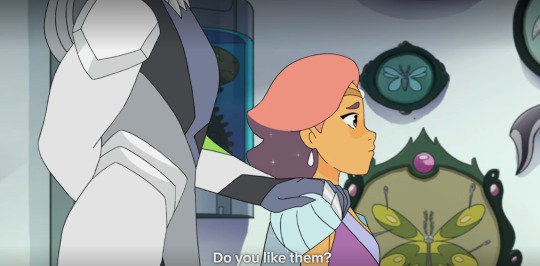
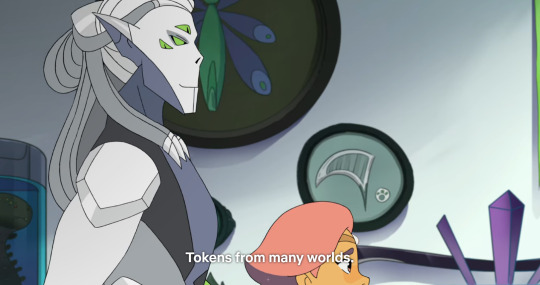

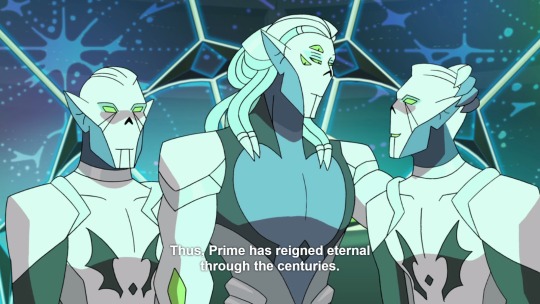
There is no point in the show where Hordak relishes over his status as a ruler or the “luxury” it affords him. He does not engage in the same behaviors his progenitor manifests. He attempts to emulate Prime in order to project authority in the only way he knows how but since those are some really big shoes to fill, he is woefully inadequate.
If Hordak had been power hungry, he would have stayed in despondos and ruled his own faction. Being away from Prime is the most powerful and autonomous he’s ever been and yet, he wants to throw all of that away in order to be a powerless, nameless part of the whole. What Hordak wanted was to be enslaved by Prime because that’s what he had been created for.
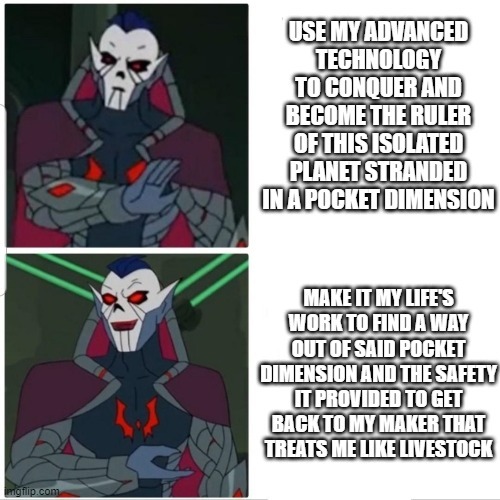
“vengeful” – and how did Hordak manifest this vengefulness? Who did he take revenge on in the series?
“apologize” – when and where in his 3 minutes of screentime would he remember everything after 2 mindwipes, realize that the whole worldview he had since inception is wrong, realize that he had been mistaken into doing the horrible things he did and then go to all of the characters and apologize for it?
Would anyone be convinced of that had it happened in 3 minutes? I’d rather they don’t redeem him than do a shit job at it.

Very true. He’s not a better person. He’s just a person in an impossible situation. Both Hordak and Catra were handed a raw deal, I don’t understand why everyone insists on pitting them against one another. They both did bad things and they were both in horrible situations. The specifics don’t really matter since neither of them would have done the things they did had they been more fortunate.

This is the exact reason for which I don’t hold Cara’s actions against her. Catra’s only model of success was Shadow Weaver. She emulated her abusive mother figure because she had no other example and because she wanted to please that woman. It does not excuse the way Catra acted but it explains it.
I really don’t understand why some people want Catra punished. I’d rather she get love and help. That is what she needs. In time, she will want to do better and be better by herself. She doesn’t need to be forced, heavens know, she’s been forced enough as it is.
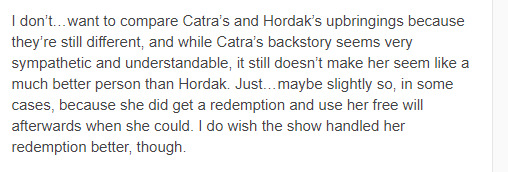
They are really different. Catra got an abusive, shitty and violent childhood. Hordak got this:
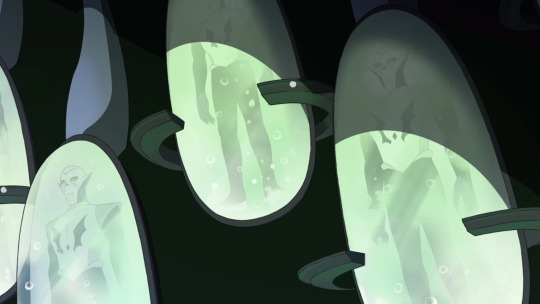
He was literally robbed of a childhood.
She was taught by Shadow Weaver that weakness gets you killed. Hordak was not allowed to have emotions to begin with, or thoughts of his own, or a name...
Comparing to victims of abuse to see which one of them is more likable is such a strange concept to me.

Catra was robbed in s5 too. I don’t hold that against her. I blame it on the writers. S5 could have been a lot better.
#Hordak#Catra#catra vs hordak discourse strikes again#can we please stop with this#it's been 6 months#my pixel is nicer than that pixel#a cartoon villain is not an actual despot#cartoon and fandom activism is not real activism#Cartoon characters can't apologize for their actions unless the writers make them#the writers in s5 were too busy with butchering the previous seasons to actually put any thought into the cohesiveness of this show's themes#everyone felt a bit ooc in s5#spop critical#spop fandom drama#spop
195 notes
·
View notes
Note
Hello, how are you doing these days? I'm back with another ask. Since we see the term 'potential' being applied to characters a lot now, do you think Itachi had any 'potential' to be an interesting character? It is a bit later that he became a mess of theme- and plot-related mistakes, but do you think in there's any basis in canon for him to have been a decent character? One that, if not complex, at least made sense? Thank you and have a great day!
OMGG HIII FAV MUTUAL i been okay these days so busy w my new job but good. howre u?
I think Itachi had the potential to be an interesting character. Itachi’s character could have been extrapolated in so many different ways that seeing him shoved into a corner just ARGGH. there’s not much depth to him despite popular belief.
It’s crazy to me because part 1 Itachi HAD SO MUCH POTENTIAL ARGGH. It’s like.. man the fear? The way all of the jounins and konoha just couldn’t match him at all! That build up was so nice. His confrontation with Sasuke where he chokes him. It’s so good!!!
I think the reason Itachi’s character fails so spectacularly is because of how the narrative wanted to warp him into someone who “wasn’t that bad” or “had good intentions to save the village but his method of action was flawed” (i see this argument a lot honestly) this argument is reiterated by obito and later naruto and kakashi. because itachi committed genocide to save konoha, he’s seen as morally grey despite the fact that the village he’s saving is highkey fascist and fucks over so many smaller, weaker villages (case in point, NAGATO!) konoha is LITERALLY a military dictatorship. there’s absolutely nothing good about that awful village and itachi killed his family for it
okay now back to my initial point, itachi killing the uchihas for konoha is fundamental to his character, it shapes him... but my god he would have been sooo much better as only an antagonist instead of someone in the middle. I understand that he was manipulated by the elders but Itachi as an antagonist would have still worked even after the plot twist of killing for konoha. He fails because his character sort of stretches out to shadow over everyone else. he’s painted out to be unbelievably strong and infallible even in death to the point it’s just laughable and it isn’t done well either because there’s no purpose to it. it does not forward the plot, it just feels like fanservice. he doesn’t fit into the story with the characters at all. it feels so forced, grating and awkward. suddenly these characters established to be the best of the best are tripping over their feet over a sick shinobi with eyes that are almost blind
His character isn’t that developed; his persona of being strong, deadly and calm is never questioned or challenged. He’s either this loving brother full of guilt or a perfect shinobi. It’s boring! Sasuke loves him when he finds out the truth, the hokages call him a hero and... that would have been a really good point to show how corrupt and horrific the shinobi system is but Itachi’s actions are never questioned! there’s nothing in the narrative in shippuden to make you believe that Itachi was wrong other than his regret (this is mainly because of how the Uchihas are viewed by everyone) And his regret is targeted more at making sasuke suffer than the killing of his clan.
Making Itachi a compelling character could have been done in so many ways so long as there wasn’t this suffocating attempt to justify him in the manga.
And I guess properly flesh out his motives. He kills his clan for konoha for Sasuke. Okay. He joins the Akatsuki to spy on them for Konoha. How would that have worked? If we’re going along with him being a spy, maybe we can be shown how he gradually loses all his morals, finds killing easier. Maybe there’s a moment where he’s surprised at how easy he finds it to fit in with Akatsuki. It would explain his torture of Sasuke more if his default reaction to anything that isn’t entirely numbing is violence. Maybe instead of everything being some greater manipulative bullshit, moments where he harms Sasuke are genuine lapses in control. He’s so obsessed with Sasuke he can’t even rationalise his actions.
(I’m still of the belief that him joining the Akatsuki as a spy was an awful plot point. It would have been better if he only joined the Akatsuki to amplify his villainous persona so Sasuke feels even more inclined to kill when he’s going around terrorising people. I feel like Itachi after killing the clan no longer caring much for Konoha, only Sasuke and a weird obsession for peace because that’s what he also did all of this for, would have been a far more interesting twist. He’s a very selfish character that gets interpreted as selfless for the “sacrifices” he makes because the shinobi think he’s right.)
We need to be shown just how horrific Itachi’s actions are the same way we were shown in part 1 Naruto. And other than the physical consequences, the mental ones too.
I guess what would make Itachi more interesting as a character if we went along with his canon actions would be to see his thought process more. This guy killed his entire clan—show us how twisted his mind can be. Show us how the guilt/self hatred/anger/apathy destroys himself until he’s quite literally begging Sasuke to kill him in his mind.
Rather than having his machinations work out, what if he fails? What if it goes wrong? We need more moments where he’s failing. Not beating legendary characters like Orochimaru. There’s no satisfactory release to Itachi, even in his death. It’s very bland.
I don’t think the plot twist of Itachi killing for konoha in itself was bad, it’s more the execution that was bad. Because we’re already shown in part 1 that Konoha is corrupt. The plot messes come from 1) the urge to make Itachi out to be infallible and righteous but deeply troubled and 2) the narrative trying its hardest to paint the uchihas out to be inherently evil and 3) the lack of accountability placed on individuals and more on “the cycle of hatred” ignoring that it’s these Kages in power who were perpetuating that system.
Okay so I will forever be salty at the direction Itachi’s character took. They took a mysterious older brother and turned him into a plot convulted mess with the worst fake deep quotes and annoying op attacks pulled out of his ass. almost damn well ruined Sasuke’s character too smh. So yeah bestie Itachi had sooo much potential. He could have properly been used as an instrument to show shinobi like the protagonists that Sasuke’s anger is valid and that the village they fight for is evil and not worth it or to properly allow the Uchiha to receive justice but nooooooo guys he felt bad :( and he loves sasuke :( and he was a spy for the village all the protagonists are from fighting terrorism in the shadows :( and the uchihas deserved it for rising up against the village that was discriminating against them :( clearly state sponsored genocide isn’t that bad :( yeah he tortured his brother and his spying did nothing to stop akatsuki but he tried :(
#asks#this is so messy i don’t think anything i said makes sense but i still hope you understood hahsjsjd#uchiha clan#anti konoha
43 notes
·
View notes
Text
@onmywaytobe #this btw is why anything past a first draft is so intimidating#however I do think I’m decent at planning out the development ahead of time?? idk#i hate the idea of a second draft or third draft#i hate the idea of rewriting unless it’s really bad#the last couple steps are fine I’m good at line editing and copy editing#but the development is what’s so intimidating to me
@froggyfroo #incredibly based post#this is fenuinely something ive been struggling with - I've never really got past a first draft before#even tho for a few of my written eorks I'd rly like to - i feel like Idk anything about writing sometimes so this is i valuable to
You guys are SO valid haha developmental editing is also the bane of my existence. My advice, which you can take as you want (or not at all), is to seek out a betareader and/or do things step-by-step.
Finding a betareader is difficult in itself, but once you do, simply tell them you need developmental editing, that you want to look at the story as a whole and ask them specific questions relating to that goal. Does the plot progress too slow? Too fast? Does it make sense? Is the trajectory building in a satisfying way? Etc. Then wait for their feedback and use it to inform your own opinions and decisions. If you vehemently disagree with something, then you know you disagree and whatever they wanted to change you prefer to leave the same! Even that alone is invaluable help, because otherwise you might have not been able to form an opinion at all and/or waffled back and forth about it for ages. More betareaders are better, of course, but sometimes you gotta take what you get. Ideally, your betareader is not a family member or friend. They cannot be trusted to give you the full and unfiltered truth. Find a stranger. There are forums on Goodreads and Reddit dedicated to seeking out a beta, and surely you can put out feelers on Tumblr for betareaders as well.
Step-by-step is admittedly more complicated, I hope to compile an "editing masterlist" of sorts that's basically a checklist of the entire editing process but as I have yet to do that, here's my simplified (coughItriedtomakeitsimpleokaycough) break down of the stages of development editing: 1. Scan through your manuscript and create an outline. Whether this is just writing the chapters and the most important plot point in that chapter, or more in-depth summary of each scene is up to you. This allows you to look at your story as a whole with a quick(ish) glance. Even if you have an outline from before you started writing, it's best to pretend that one doesn't exist and make a new one off the manuscript to be sure it accurately represents it. Now you can track plot progression, see if there are stale chapters or scenes (or unnecessary ones), make sure the plot builds in a natural and satisfying way, etc. There are a ton of different frameworks you can compare and contrast against (like the most famous "Hero's Journey"), so you can certainly look for specific beats of such tried-and-true formats and conform your story accordingly. Personally, I don't think perfectly matching the cookie-cutter molds is necessary for a good story. If you feel confident enough in your own criteria, judge it by that! 2. Do the same thing, except with your important characters' arcs. Again, it's up to you to decide what the important characters are, it doesn't have to just be the protagonist(s) if there are involved side characters, and antagonists can get in on this too. This should be a different outline from the first, and each character should get their own. Really what you want from this is to track the progression of your characters (upward or downward) and see how it lays out. Is there a sudden change too soon or too early? Is the change justified with an inciting incident? Does the arc make sense? Are you satisfied with how the character changes, and who they end up being by the end? Look specifically at: motivations, internal and external goals (I want to be the best warrior vs. I want to save the world), biases, attitude/behavior, virtues, and flaws. Not all of these need to change, and what does change doesn't necessarily have to change drastically. It's up to you. But if the character is important, it's generally good storytelling for something to change in them, for the consequences of the story to have had some kind of effect on them. Keep in mind, an upward character arc generally takes flaws and improves them or turns them into virtues (e.g., an angry, bitter character becoming confident and resolute) and a downward character arc generally takes virtues and turns them into flaws (e.g., an extremely loyal and law-conscious person becoming ruthless and cruel in order to maintain their loyalty and the order of law). Again, this isn't OBLIGATORY, as nothing is in writing, you're allowed to do whatever the heck you want!
3. Consider the changes you want to make. Do this whatever way suits you best. If brainstorming/daydreaming is best for you, then go for it! If you like writing things down, do that. If you need to brainstorm and bounce ideas off another person, find someone to help! Unlike a betareader, this can be a trusted friend, because you might not necessarily need harsh truths, but only a fresh or second pair of eyes.
4. Once you've figured out what you might want to change, add, rearrange, or delete, get back to writing and implementing those edits!
If anyone else has any advice or ideas, feel free to chime in! I am by no means the authority on this, because, as I said, I also hate developmental editing lol.
2 notes
·
View notes
Note
I’m having some trouble figuring out what I want to do with the plot of my book... so at first I wanted to have a revolution/rebellion based story but then I noticed that that is sort of overdone and overused, especially in YA...
Figuring Out a Plot for Your Novel
There are so many great books, particularly in YA, about revolutions/rebellions--but that’s the problem, there are sooooo many of them. And as much fun as these stories are, there are a lot of problems with them, most notably the fact that it’s never convincingly realistic that all these adults with decades of experience in leadership, politics, and the military would fall in line behind a 16-year-old whose only qualification to lead is a prophecy, birthmark, defiant act, or some other reason they bumbled into.
So, what are some alternatives? Well, that depends on exactly what you want to write...
1) Age Category: Are you writing for kids, middle grade, YA, or adults? The age of your target audience will certainly influence what you choose to write about.
2) Genre: Plot and genre go hand-in-hand. Do you want to write contemporary fiction, fantasy, science fiction, urban fantasy, romance, adventure/thriller, mystery/crime, supernatural, horror/suspense, dystopian/post-apocalyptic, historical fiction, literary fiction?
3) Sub-genre: Every genre has a sub-genre, and that will also affect your plot. For example, if you’re writing fantasy, are you writing high fantasy, low fantasy, dark fantasy, urban fantasy, fairy tales, superhero fiction, steampunk?
4) Core Conflict: Most genres and sub-genres have a bunch of core conflicts that are common, such as rebellion/revolution showing up a lot in YA fantasy and YA dystopian. Once you know your genre and sub-genre, you can do a little research to find out what core conflicts are common for that genre and sub-genre. Are there any that seem less common to you? Is there a way you can take a common core conflict and twist it around in a new way? In my book that’s out, I chose to subvert the rebellion idea by focusing on an underground political revolution that my protagonist didn’t start, but was brought into, and instead of having her lead it or effect the most change, I gave her an important role but made it clear that she was a small part of a much bigger movement.
5) Your Character and Their Story: Once you’ve decided on a core plot and how you’re going to make it fresh, you can start to think about who your main character is, what their “normal life” is like, and what sort of thing--related to that core conflict--turns their life upside down and forces them to take action by pursuing a particular goal. The goal your character chooses to pursue, the reason they choose to pursue it, the antagonist/antagonistic force that stands in the way of their success, their struggle to overcome the resulting obstacles placed in their path, and the final showdown where they overcome the antagonist/antagonistic force once and for all... that’s your plot. That’s what a story is all about.
And it’s important to remember that every one of these points doesn’t have to be some colossal event. Your character’s goal doesn’t have to be saving the world or restoring the rightful king to his throne.Their motivation doesn’t have to be selfless or benevolent. The antagonist doesn’t have to be a “bad guy” or even a sentient being... it could be an overprotective parent, natural disaster, or disease. Obstacles don’t have to be bloody battles or dramatic flights with the antagonist in hot pursuit. The final showdown doesn’t have to be an epic battle or a fight to the death. Your story could be about a high school student (protagonist) who craves transformation (internal conflict), which he thinks he’ll get on a summer trip to Paris (motivation), so he resolves to get straight As so his parents will let him go on said trip (goal), but he ends up falling in love with his tutor who inadvertently distracts him from studying (distraction is the antagonistic force here, or you could say the tutor for being the source of the distraction), making each test and project more difficult to pass (obstacles), and that forces him to double down and pass a particularly hard exam (climax/showdown) so he can get all As and go to Paris, with his new boyfriend, as it turns out (happy ending.)
My Plot & Story Structure post master list has more posts that will help you get your plot all sorted out. Good luck!!! ♥
•••••••••••••••••••••••••••••••••
Have a writing question? My inbox is always open!
Visit my FAQ
See my Master List of Top Posts
Go to ko-fi.com/wqa to buy me coffee or see my commissions!
109 notes
·
View notes
Text
Mia's World Theory
Because I have other things to do but would rather over-analyze webcomics. Under the cut because long and Spoilers up to page 85.
One of the really interesting things about Mia's World, I've always thought, is that a majority of people come in knowing what the climax of the story is. I was first introduced to Mia's World through the Mind Electric Animatic, only finding the actual comic a few months later. As such, I, and pretty much everyone else I've seen, know that the comic is building up to World/Michael (likely under the influence of Lyer/John?) killing Mia, as both the Mind Electric animatic and Turn Off the Lights MAP deal with the direct fallout of that. But the thing that makes the comic so interesting is not only seeing what their world looks like and who the characters are, but also the buildup leading up to Mia's murder. One of the first hints that there seems to be something more going on is that, while for much of the comic it seems like Lyer/John might just be a figment of World/Michael's imagination or perhaps an entity that only he can see/interact with, we have at least two other instances of characters aside from World/Micheal noticing/seeing Lyer/John. The more minor of which is when King/Gillian comes to see World/Micheal at his apartment and is also able to hear when Lyer/John is singing in the shower.

The much more significant instances of this are the several occasions where Mia is able to see Lyer/John.


And, probably most concerning about this, is how concerned Mia is about this, and how afraid she is of Lyer, as well as how antagonistic Lyer seems to be towards Mia in return.

Including the fact that Mia seemed subconsciously aware of Lyer, before she was consciously aware of him, as shown in her concern over the number of drawings she has with Lyer in the background (seemingly drawn in without her being directly conscious of it, though I could be mistaken about that).

The thing that I think this all really builds up to is the fact that Mia's World is, quite literally Mia's World, in that it is a world that she controls or was/is responsible for creating to some degree. Part of a hint for this could be that she is the only character who is only known by her actual name, Mia. World and Enemie have had their actual names mentioned in the comic (also Lyer, but more on him later). King and 44, while they have had their names revealed out of comic, they have only been referred to by these nicknames in the comic proper
One interesting thing about Mia's World is the difference between the art style when the page is centered around Mia and her POV, and the art style when the page is centered around World/Michael and his point of view. With Mia, the art style is significantly more simplistic: the characters all have stick limbs with the occasional hand, there is little to no shading, undetailed or entirely absent backgrounds, and the pages are often only four panels, more reminiscent of a newspaper or otherwise serialized comedy/slice of life comic that rarely has much in the way of a serious or overarching plot. With World/Michael, the style is much more painterly and artistic, with more complex coloring and shading, as well as backgrounds with equal or even higher complexity, more realistic figures (in that they have actual limbs more often rather than just sticks), and usually six or so panels per page, more reminiscent of comics that tend to have longer overarching plots, rather than just one-off jokes. This partly serves to create this pretty strict dichotomy between "Mia's World" and "Michael's World" (this could also be part of the reason that World's name is, well, World: he is [currently] the other main character/POV character of this comic and is the character shown to have the most awareness of some of the strangeness of the world that they all live in currently).
The thing that I think this all really builds up to is the fact that Mia's World is, quite literally Mia's World, in that it is a world that she controls or was/is responsible for creating to some degree. Part of a hint for this could be that she is the only character who is only known by her actual name, Mia. World and Enemie have had their actual names mentioned in the comic (also Lyer, but more on him later). King has only had his name referred to out of comic and never in comic. And to my knowledge, 44/Maria has only ever been referred to as "big sister" by Mia, and not by 44 or Maria in comic. This partially seems to really emphasize that these characters are, well, characters. King and World and Enemie and 44 aren't real person names, but it's how they're known in this comic, it's their character.
And finally, that brings us to the most recent page.

World/Micheal falls out of the world. He takes a step and punches through the ground like (it looks to me) paper. Then we get a silhouette of a very human-looking version of him. A commenter on this page notes that, in the Turn Off the Lights MAP, there was a specific section where all the characters should appear as human.
To bring this all together, Lyer is a chaotic character, who manipulates and messes with and taunts World/Michael seemingly just for the fun of it. But I think Lyer also serves as a catalyst, of a sort, to get World/Michael to break out of Mia's world, ultimately (attempting to?) accomplish this by having World/Michael murder Mia, potentially breaking her hold over this world. I don't know what Lyer is or where he might have come from, or what his motivation might be, but it seems to me that his purpose in murdering Mia is to break her (godlike?) hold on this world, potentially freeing World/Michael, maybe also Lyer and the rest of the characters.
There are certainly other plot elements that may play into the mystery behind Mia's World that we don't have enough information to properly analyze yet, like World/Michael and King/Gillian's strained (but healing?) relationship, 44/Maria's intense dislike for World/Michael (potentially related to the previous point), King/Gillian and 44/Maria going through a rough patch in their relationship, Enemie/Ivan dealing with an abusive parent, etc. But I'm not going to theorize on how these could tie in now since we don't have much information on them yet.
39 notes
·
View notes
Text
Van Zieks - the Examination, Part 1
Warnings: SPOILERS for The Great Ace Attorney: Chronicles. Additional warning for racist sentiments uttered by fictional characters (and screencaps to show these sentiments).
Disclaimer: These posts are not meant to be taken as fact. Everything I'm outlining stems from my own views and experiences. I am a 30-something European woman, and therefore may not view the matter from certain angles. That said, I'm always open to more input from others. If you believe that I've missed or misinterpreted something, please let me know so I can edit the post accordingly. If we can make this a team effort, I would love that.
The purpose of these posts is an analysis, nothing more. Please do not come into these posts expecting me to either defend Barok van Zieks from haters, nor expecting me to encourage the hatred. I am of the firm belief that characters are no more than a tool created to serve a narrative purpose, therefore the question I'm posing is whether or not Barok van Zieks serves this purpose. That's all I'm doing here.
I'm using the Western release of The Great Ace Attorney Chronicles for these posts, but may refer to the original Japanese dialogue of Dai Gyakuten Saiban if needed to compare what's said. This also means I’m using the localized names and localized romanization of the names to stay consistent.
It doesn't matter one bit to me whether you like Barok van Zieks or dislike him. He's not real anyway, so he can't suffer from it. However, I will ask that everyone who comments refrains from attacking real, actual people. If you know you're morally in the right, there should be no need for insults to begin with. Let's keep this conversation civil and constructive! As the first post in a series, let’s first start by examining the expectations we would have for a character like this. The purpose he was meant to serve.
1: Expectations
As I said in a different Barok-related essay, the main prosecutor of any Ace Attorney game has been, and always will be, an antagonistic force. Not a villain, not even necessarily someone who exhibits immoral traits. (Hi Klavier!) Just someone who impedes the protag’s goal of getting a not-guilty verdict. In order to have an effective antagonist, they need to mirror the protag's weaknesses back at them. Ace Attorney does this quite well, as the prosecutors represent the obstacle/turmoil that the defense needs to overcome. Often times, the prosecutor is also tied to a pivotal moment in the attorney's past, making sure the strife is quite personal.
Considering the game's plot and settings, it would've been difficult for Barok to be tied to Ryunosuke's past. (He is tied to Asogi's past, funnily enough, but that's a matter I also addressed in that other Barok essay.) So instead, Barok represents Ryunosuke's struggle in more of a figurehead capacity. I've seen people dub him the 'CEO of Racism', and I'm not gonna lie, in a way that's correct. Barok was designed to be the mouthpiece of the harmful sentiments Japanese exchange students would have encountered in the 1900s. By extension, since Ryunosuke is an exchange student unfamiliar with the British courts (or even courts in general), the prosecutor would target the fact that Ryunosuke 'does not understand how things are done here'. Which he does- a lot. This makes it all the more satisfying when Ryunosuke proves him wrong by outsmarting him and using Britain's own laws (such as the closing argument) against him. So yes, you may hate Barok for uttering racist sentiments and dismissing Ryunosuke's abilities, but the ultimate goal here is that Barok's defeat is made sweeter as a result. The narrative end-game is Ryunosuke's triumph and validation in the courtroom.
Was there a different personal struggle Barok could have represented? Yes, but also no. Sure, his vendetta could have been strictly with the Asogi family and Ryunosuke could have admitted to carrying Asogi's resolve, not knowing what it meant. Though that would’ve implied very early that Asogi had a history of sorts in Britain and would’ve destroyed some of the surprise we experience in game 2. Alternatively, there was also the 'parallel' antagonist angle. The sort of villain who says the line “we're not so different, you and I.” The antagonist who shows what happens when someone with the same skills or motivations follows the wrong path, which emphasizes the right path for the protagonist. However, I can't see that working in the plot of this game.
A purposeful decision was made by the writers to have prejudice be a central theme of the plot. This is the matter that hits the hardest in an emotional sense. Therefore, having Barok be the centerpiece of this prejudice ensures he leaves the biggest narrative impact.
---
However, another long-running aspect of the AA prosecutor is the redemption arc, so let's turn our attention to that!
I'm not going to put too much effort into explaining this, I just want to talk about the requirements of a redemption arc. We all know these types of arcs, a lot of Ace Attorney prosecutors have them. We see them in fiction all over. Noteworthy examples of redemption arcs done well include Zuko from The Last Airbender, Michael from The Good Place... For argument's sake, let's toss Edgeworth in there too. I'm not saying Edgeworth's arc is done well, but at the very least it is accepted by most as something that served its intended purpose. I've never seen anyone question Edgeworth's transformation.
See, what we have here is a bit of a misnomer when it comes to what people expect to get out of these types of arcs. Redemption in itself is only 'deliverance from sin' or 'being saved from evil'. It's the thought that a horrible person can still see the error of their ways before it's 'too late'. However, when it comes to absorbing media, often a character gaining knowledge that they were in the wrong isn't enough to satisfy the audience. Would Edgeworth have had a satisfying redemption arc if he'd acknowledged his arrogance and dirty tactics, only to retire as a prosecutor? No way. We needed him to return in the following games to give us an update on his status. Standing in court as a defense attorney, at the risk of damaging his reputation, was the moment we knew he'd grown for the better.
What we require for the arc to come to a good conclusion is atonement. The character in question must not only apologize for their actions, but repent in a more active manner to show that they've changed their ways. Following that, the atonement must be acknowledged by others. So for example, Zuko joins the ATLA gang to help them in any way that he can until even the most skeptical of the group, Katara, acknowledges his transformation into a better person. Now add to this the notion that the character's atonement must be virtuous and sincere. The Good Place is a fascinating look into the debate of 'is it ever too late for a person to change?' and the moral complications of changing in the first place. If you're only doing good things because you want to be saved from damnation, are you being a good person or are you being selfish? There's such a thing as corrupt motivation; only doing good because it is expected. For example, does sponsoring a library make Magnus McGilded a good person? It does not, since he's only doing it to boost his own reputation and have people believe he's selfless.
As a final note, I want to ask: Does a redemption arc require a backstory to justify the character's immoral ways? Personally, I don't think that it does. It's good to have, since it allows an audience to empathize with the character and give them more of a reason to root for them. It turns the redemption arc into a tale about overcoming past trauma. However, it can backfire when done badly and lead to frustration. (I'm looking at you, live action Disney movies!) Some characters are evil just for the sake of being evil and even then, they can turn over a new leaf because they realize it is just so much more rewarding to be good. Just look at Michael from The Good Place.
What's more effective than a backstory, in my opinion, is smaller details to humanize a character. Humanization can also lead to empathy, perhaps even relatability, and helps us believe that they're capable of change. We need to be told that a character has their own fears, their own flaws, their own odd little habits which deviate from the norm... Again, I'll point to Michael from The Good Place for this. Another humanization tactic, which we see employed often in Ace Attorney, is to display a prosecutor's likes and hobbies outside the courtroom. Edgeworth's fanboying over the Steel Samurai, Blackquill's love for birds, Nahyuta's willingness to stand in line for hours to get his hands on a delicious burger... I've feel ya, Nahyuta. This tactic is more readily employed in Ace Attorney because it's difficult to place a prosecutor in a position of weakness before the final showdown. You can show them tending to hobbies during Investigation segments, but you can't show them waking up from a nightmare or wondering whether their father loves them. Well, not until case 5 of that game, anyway. By then, it's too late to serve as the sole humanization factor. Did Van Zieks need to be redeemed at all? The way I see it, the only correct answer is yes. What do we want to see in our world? Do we want people who hold racist prejudice to acknowledge their faults and become better, or do we want them to die clinging to their shitty moral compass? Do we want a world where everyone learns to get along, or do we want a world where people continue to be in the wrong and act like assholes until they inevitably get punished by law for something or another? Van Zieks needed to be redeemed in order to teach that valuable lesson that it’s never too late to be a good person and that it pays to be a good person.
So to summarize, what we needed from Barok van Zieks was the following:
1) Present an antagonistic (possibly immoral) force who personifies Ryunosuke's biggest personal obstacle/weakness, in this case racial prejudice. 2) Humanizing traits begin to show. OPTIONAL: A backstory to justify any immorality he has. 3) Over time, Barok has his realization and sees the error of his ways. 4) Barok atones for his immorality, not simply through apology but by taking decisive steps. 5) The cast around him acknowledges his efforts and forgives him.
This leaves us with the question: Does the game deliver on these points? Well, let's boot it up and find out! Stay tuned for The Adventure of the Runaway Room! (as a warning, it’s gonna be LONG)
#dgs#dgs spoilers#tgaa#tgaa spoilers#barok van zieks#oh god here we go#i actually already finished Runaway Room but I need to let it sink in#it was a doozy
50 notes
·
View notes